DOWNLOAD NEWS 2014/10
by Brian Wilson, Geoffrey Molyneux and Kirk McElhearn
Reviews are by Brian Wilson except where stated.
DL News 2014/9 is here and the Index of earlier editions is here.
Index for 2014/10:
BACH Keyboard Concerto No.4_Dart + HANDEL, LEO, VIVALDI_Beulah Korea
BACH Organ Music_Dumon_Parnassie see BUXTEHUDE
BALAKIREV Islamey_Goetzel + RIMSKY-KORSAKOV Scheherazade, IPPOLITOV-IVANOV
Caucasian Sketches (excs)_Onyx
BAROQUE ERA I AND II_Hogwood, etc._Decca
BAX Winter Legends, Symphonic Variations_Thomson_Chandos
Four Orchestral Pieces; Phantasy for viola and orchestra, etc._Davis_Chandos
BEETHOVEN Symphonies_Karajan (1963)_DG
Late String Quartets (orchestral arrangements)_Camerata Nordica_BIS
String Quartet Op.131; Große Fuge (arrangements)_Oundjian_BIS
Piano Sonatas 13-15_Dablemont_Resonus
BERLIOZ Harold en Italie, etc._Berthaud/Slatkin_Naxos
Harold en Italie, etc._Zimmerman/Davis_LSO
Harold en Italie, etc._Menuhin/Davis_EMI
BIBER Mystery Sonatas_Batttalia_Ondine
BIBER Mystery Sonatas_Manze_Harmonia Mundi
BLOCH Symphony in E flat, 3 Jewish Poems, etc_Atlas_Naxos
BOWEN String Quartets 2 and 3; Phantasy Quintet_Naxos
BRAUNFELS Piano Concerto, etc_ Wildner_Dutton
BRUCKNER Symphony No.1_Abbado + BEETHOVEN_Eloquence
Symphony No.9_Abbado_DG
BRUHNS Organ Music_Dumon_Parnassie - see Buxtehude
BUXTEHUDE, BRUHNS, BACH Organ Music_Dumon_Parnassie
BUXTEHUDE Organ Music_Alain_Warner Apex
BUXTEHUDE Organ Music_Rogg_Warner/EMI
CABANILLES Organ Music_Butt_Harmonia Mundi
CANTICLES from St Paul's_Carwood_Hyperion
CHARPENTIER MA La Descente d'Orphée, etc._Boston Baroque_CPO
CHOPIN Piano Concerto 1_Wunder + TCHAIKOVSKY_DG
DOHNÁNYI Piano Concertos 1 and 2_Shelley_Chandos
DOHNÁNYI Piano Concertos 1 and 2_Roscoe_Hyperion
DOHNÁNYI Piano Quintets 1 and 2, Serenade_Schubert Ensemble_Hyperion
DOHNÁNYI Piano Quintet 2; Sextet_Tatrai Quarter etc._Hungaroton
DUSSEK Piano Concertos_Shelley_Hyperion
Piano Concertos_Staier_Capriccio
ELGAR Introduction and Allegro, Serenade + VAUGHAN WILLIAMS_Beulah Korea
FARNON, etc. The Age of Light Music_Beulah
GERSHWIN Great Light Orchestras Salute + KERN_Guild Light Music
GLUCK Orfeo ed Euridice_Jacobs_Harmonia Mundi
Orfeo ed Euridice Maag_Arts
Orfeo ed Euridice Östman_Naxos
GOLDEN AGE OF LIGHT MUSIC_A Glorious Century_Guild
Lost Transcriptions 3_Guild
More Strings In Stereo_ Guild
Music While You Work 5_ Guild
Thirties Revisited_ Guild
Springtime_ Guild
Guerra Manuscript Volumes 1-3_Vilas_Naxos
HAYDN Symphonies 90 and 92_Fey_Hänssler
HAYDN Symphonies 90-92_Goodman_Hyperion Helios
HAYDN Symphonies 98 and 103_Fey_Hänssler
IRELAND Earth's Call (soprano songs)_ Frederick_Somm
JENKINS etc._Tickle the Minikin_Smith_Resonus
JOSQUIN Missa Hercules, etc_Hilliard Ens + LASSUS, OCKEGHEM etc_Virgin
Missa Hercules, etc._A Sei Voci_Auvidis/Naïve
KERN_Great OrchestraS Salute + GERSHWIN_ Guild
LASSUS Motets, Penitential Psalms_Hilliard Ens + JOSQUIN, OCKEGHEM_Virgin
MENDELSSOHN Symphonies 1 and 3_Gardner_Chandos
MEYERBEER Ballet Music_ Nesterowicz_Naxos
Overtures and Entr'actes_ Ang_Naxos
Les Patineurs_Naxos Archives
Struensee, Les Patineurs_ Jurowski_CPO
MONTEVERDI 'Vespers for St Mark'_Alessandrini_Naïve
MONTEVERDI Selva morale e spirituale_The Sixteen_Coro (x3)
MONTEVERDI Sacred Music_King's Consort_Hyperion (x4)
MONTEVERDI Masses_The Sixteen_Hyperion Helios
MONTEVERDI Sacred Music (selection)_Kirkby_Hyperion Helios
MOZART Piano Concertos 18 and 19_Uchida_Decca
Piano Concertos 18 and 22_Brautigam_BIS
Piano Sonatas 7, 11, 15 and 16_Hansen_Beulah
OCKEGHEM Masses and Motets_Hilliard Ens + JOSQUIN, LASSUS etc_Virgin
OFFENBACH Overtures_Scherchen (1961)_Archipel
PALESTRINA Volume 5_The Sixteen_Coro
PÄRT Berliner Messe; Magnificat_Polyphony_Hyperion Helios
PIAZZOLLA Bandoneón Concerto, etc._ Pons_Harmonia Mundi
Tres moviementos, etc._ Castagna_Chandos
PORTUGAL Missa Grande_Chœur L'Echelle_Paraty
Vespers; Mass in F_ Ensemble Turicum_Toccata
RIMSKY-KORSAKOV Scheherazade_Goetzel + BALAKIREV, etc_Onyx
RIMSKY-KORSAKOV Scheherazade_Oundjian_Chandos
RIMSKY-KORSAKOV Scheherazade_Ansermet (1948)_Naxos
SHOSTAKOVICH Jazz Suites; The Bolt_Kuchar_ 2xHD
Jazz Album_Chailly_Decca
Piano Concertos 1 and 2, etc._Alexeyev_CfP
STEINER Gone with the Wind_Steiner_Naxos Archives
Gone with the Wind_Gerhardt_RCA
STRADELLA La Forza delle Stelle_Mare Nostrum_Arcana
STRADELLA Cantatas_Brandes, etc._Harmonia Mundi
TCHAIKOVSKY Piano Concerto 1_Wunder/Barenboim + CHOPIN_DG
Piano Concertos 1 and 2, etc._Hough/Vänskä_Hyperion
TEIXEIRA Te Deum_The Sixteen_Coro
 Bargain of the Month
Bargain of the Month
Franco-Flemish Masterworks
Johannes OCKEGHEM (c1410-1497)
Requiem [36:29]
Missa ‘Mi-mi’ [26:13]
Missa prolationum [34:15]
Marian motets:
Alma Redemptoris mater [5:45]
Salve Regina [5:31]
Intemerata Dei mater [8:16]
Ave Maria [3:36]
Salve Regina [10:24]
Josquin DESPREZ (c1450-1521) Motets and chansons
Ave Maria
Absalon fili mi
Veni Sancte Spiritus
De profundis clamavi
Scaramella va alla guerra with LOYSET COMPERE (c1445-1518) Scaramella fa la galla
In te Domine speravi
El grillo
Milles regretz
Petite camusette
Je me complains
En l’ombre d’ung buissonet
Je ne me puis tenir d’aimer
La déploration de la mort de Johannes Ockeghem
Missa Hercules Dux Ferrariæ [26:34]
Pater noster/Ave Maria
Anon. ? Nicolas GOMBERT (c1500-1556)
Lugebat David Absalon [9:37]
Miserere mei Deus [18:51]
Tu solus qui facis mirabilia [4:47]
Pierre de la RUE (c1460-1518)
Four-part motets:
Gaude Virgo
Vexilla Regis
Plorer, gemier
Considera Israel
Missa ‘Cum iocunditate’ [25:40]
O salutaris Hostia
Ave Regina celorum
Delicta juventutis
Orlande de LASSUS (1532-1594)
Motets:
Stabat Mater
In monte Oliveti
Cum natus esset Jesus
Chansons:
Bon jour mon cœur
Fleur de quinze ans
Susanne ung jour
J’ayme la pierre précieuse
Margot labourez les vignes
La nuict froide et sombre
Susanne ung jour
Pour courir en poste a la ville
Psalmi Davidis pœnitentiales (Penitential Psalms):
I Domine ne in furore tuo… Miserere [13:13]
II Beati quorum remissæ sunt [19:19]
III Domine ne in furore tuo… Quoniam [24:25]
IV Miserere mei Deus [22:39]
V Domine exaudi orationem meam: et clamor meus [23:06]
VI De profundis clamavi ad te Domine [9:08]
VII Domine exaudi orationem meam: auribus percipe [15:22]
WARNER ERATO/VIRGIN 6025322 [8CDs: 8:12:54] – from 7digital.com (mp3) or stream from Naxos
Music Library or Qobuz
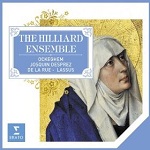 More
than eight hours of glorious early renaissance polyphony in performances
that are about as good as it gets and in top-flight 320kb/s mp3 for
just £14.99 has to be a bargain in anyone’s book. I compared the download
with the lossless (flac) stream from Qobuz and very little is lost in
the compression. I may prefer individual works in other hands such
as The Tallis Scholars, but equally the Missa Hercules Dux Ferrariæ,
recorded here, has not yet been added to the Scholars’ wonderful series
of Josquin recordings on Gimell.
More
than eight hours of glorious early renaissance polyphony in performances
that are about as good as it gets and in top-flight 320kb/s mp3 for
just £14.99 has to be a bargain in anyone’s book. I compared the download
with the lossless (flac) stream from Qobuz and very little is lost in
the compression. I may prefer individual works in other hands such
as The Tallis Scholars, but equally the Missa Hercules Dux Ferrariæ,
recorded here, has not yet been added to the Scholars’ wonderful series
of Josquin recordings on Gimell.
There are no texts, but Virgin are usually mean about providing these
with their budget-price CDs, so I doubt if there are any with the box
set or with the twofers which I mention below. More seriously, not
for the first, time the zip download of all the tracks failed to open
and I had to download each of the 83 tracks separately, then renumber
them so that they play in the correct order – something that has to
be done even when the zip download opens properly. 7digital.com don’t
seem to realise that classical music has to be played in the right order!
If you baulk at the thought of so much music at once, there are two
2-CD Virgin Veritas sets containing these performances of Ockeghem and
Josquin – both at budget price, around £8 on CD and £7 as downloads
– but it doesn’t take too much proficiency in maths to see the advantage
of the 8-disc box.
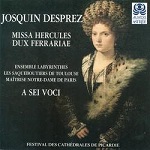 You
may be looking for a more overtly exciting recording of the Josquin Missa Hercules Dux Ferrariæ, composed in honour of Ercole d’Este,
Duke of Ferrara and patron of the arts. Instead of using a religious
or secular composition, the Mass is based on the syllables of the title,
translated into musical terms, thus Her equates to re, cu to ut (do), les to re, etc. The Hilliards
sing it with small forces and no instruments, as if performed in a private
chapel, but there is an alternative recording with larger forces and
instrumental accompaniment, on Auvidis Astrée/Naïve E8601: A
Sei Voci with the choristers of Notre-Dame, Paris, Ensemble Labyrinthes
and Les Saqueboutiers de Toulouse, directed by Bernard Fabre-Garrus
and available for download in mp3 and lossless from eclassical.com.
I found that a little sackbut accompaniment went a long way when I reviewed
the mp3 download of this recording from classicsonline.com in November
2011/1, alongside other recordings on Amon Ra and Stradivarius.
Qobuz subscribers can compare the Virgin, Auvidis and Stradivarius recordings
and Naxos Music Library offers the Virgin, Auvidis and Amon Ra albums.
You
may be looking for a more overtly exciting recording of the Josquin Missa Hercules Dux Ferrariæ, composed in honour of Ercole d’Este,
Duke of Ferrara and patron of the arts. Instead of using a religious
or secular composition, the Mass is based on the syllables of the title,
translated into musical terms, thus Her equates to re, cu to ut (do), les to re, etc. The Hilliards
sing it with small forces and no instruments, as if performed in a private
chapel, but there is an alternative recording with larger forces and
instrumental accompaniment, on Auvidis Astrée/Naïve E8601: A
Sei Voci with the choristers of Notre-Dame, Paris, Ensemble Labyrinthes
and Les Saqueboutiers de Toulouse, directed by Bernard Fabre-Garrus
and available for download in mp3 and lossless from eclassical.com.
I found that a little sackbut accompaniment went a long way when I reviewed
the mp3 download of this recording from classicsonline.com in November
2011/1, alongside other recordings on Amon Ra and Stradivarius.
Qobuz subscribers can compare the Virgin, Auvidis and Stradivarius recordings
and Naxos Music Library offers the Virgin, Auvidis and Amon Ra albums.
 Bargain of the Month
Bargain of the Month
Florilegium Series Volumes 1 and 2
Music by ARNE, BACH, CPE, JC and JS, BIBER, BLOS, BOYCE, COUPERIN,
HANDEL, PURCELL, RAMEAU, SCARLATTI, A and D and VIVALDI,
etc.
Performers include Emma Kirkby; Catherine Bott; Judith Nelson; Christ
Church Cathedral Choir, Oxford; Academy of Ancient Music; New London
Consort; Handel and Haydn Society; Les Talens Lyriques/Christopher Hogwood,
Philip Pickett, Christophe Rousset and Richard Egarr
DECCA OISEAU-LYRE [25 CDs] – Volume 1: from 7digital.com (Vol.1) or stream or download from Qobuz.
Volume 2: from 7digital.com or stream or download from Qobuz
(also issued on CD, volumes 1 and 2: 4786753 [50 CDs for around
£130]
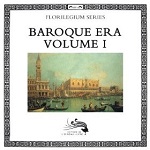 Here’s
an even better bargain: two 25-CD sets for £7.49 each from 7digital.com
– that’s around £0.30 per CD – and only a little more for lossless sound
from Qobuz at 10.29 Euros or the same in GB Pounds.
Here’s
an even better bargain: two 25-CD sets for £7.49 each from 7digital.com
– that’s around £0.30 per CD – and only a little more for lossless sound
from Qobuz at 10.29 Euros or the same in GB Pounds.
All the recordings would be at or close to the top of anyone’s informed
choices, so this would be an ideal starting point for anyone looking
to begin a collection of baroque music. Between them the two volumes
contain Bach’s Brandenburg Concertos, Handel’s Water Music – but only Suite No.1 –Fireworks and Messiah, Corelli’s ‘Christmas’ Concerto – shame that we don’t get the rest of his
Op.6 – and Vivaldi’s Four Seasons, surely the core of any collection
of baroque music.
It’s even excellent value if you already have some of these recordings
– I have several of them in one form or another, some on CD and some
as downloads, but I was still very happy to obtain the sets and, yes,
I did pay for them, putting my money where my reviewer’s mouth is.
As with the other 7digital.com download, you’ll have to sort out the
order of tracks yourself, so it’s best to download track by track, one
constituent CD at a time, which is onerous. No such problems with Qobuz.
To take just one example: Volume 1 contains the complete Handel Orlando,
HWV31 (1733), with Emma Kirkby, Arleen Augér, Catherine Robbin, James
Bowman, David Thomas and The Academy of Ancient Music conducted by Christopher
Hogwood. Despite strong challenges from more recent recordings, including
a recent Atma set – 2013/15 - that remains very well worthwhile and costs around £10.50 in its reissue
by Australian Decca Eloquence (4808813) while the least expensive
download that I can find costs £11.99 – and that in mp3 only – more
than the cost of the whole 25-CD Baroque Era Volume 1 in mp3
or lossless via the links that I have given. No libretto but that’s
easily found online, for example here,
or with Italian original and English translation here.
There’s also a new recording of Orlando from René Jacobs with
Bejun Mehta, Sophie Karthäuser, Kristina Hammarström, Sunhae Im, Konstantin
Wolff and the B’Rock Orchestra (DG 4782199) which I hope to get
round to reviewing in the near future. I’ve dipped in and first impressions
are very favourable. Listen if you can to Bejun Mehta in Ah! perfida
… Ah! Stigie larve … vaghe pupille, non piangete and you may well
be sold, unless you are put off by René Jacobs’ tempo changes. James
Bowman on the Decca set is less powerful but more affective, capturing
Orlando’s desolation rather than his rage, and there are fewer sound
effects – the aural equivalent of CGI on DG – so the two are complementary.
Mehta and René Jacobs had already recorded Ah! Perfida … for
Harmonia Mundi (HMC902077 – 2013/3).
Giovanni Pierluigi da PALESTRINA (1525/6-1594) Volume 5
Dum complerentur [5:02]
Loquebantur variis linguis [3:14]
Hymn: Veni Creator Spiritus [7:05]
Plainsong: Iam Christus astra ascenderat [3:43]
Missa Iam Christus astra ascenderat (Masses: Book V) [23:42]
Veni Sancte Spiritus [4:05]
Song of Songs: nos. 13-15 [7:19]
Magnificat quarti toni [9:10]
The Sixteen/Harry Christophers
rec. Church of St. Alban the Martyr, Holborn, London, January 2014.
DDD.
pdf booklet with texts and translations included
COR16124 [60:26] – from thesixteendigital.com (mp3, aac and 24-bit lossless) or stream from Naxos
Music Library or listen to 1-minute samples of each track from Qobuz
 Like
all the earlier volumes, this latest release contains a Mass, in this
case one for Pentecost (Whitsun) – the only available recording of this
work – and three motets from the Canticum Canticorum, or Song
of Songs. Like the Mass, the opening tracks are settings of texts for
Pentecost.
Like
all the earlier volumes, this latest release contains a Mass, in this
case one for Pentecost (Whitsun) – the only available recording of this
work – and three motets from the Canticum Canticorum, or Song
of Songs. Like the Mass, the opening tracks are settings of texts for
Pentecost.
I welcomed Volume 4 in 2013/14 by saying that performances and recording were just as enjoyable as
earlier releases in the series. Same again. The only reason not to
go for this series would be to want the Song of Songs in one collection,
in which case you are well catered for:
• Erato/Virgin 5622392 Hilliard Ensemble/Paul Hillier –
an inexpensive twofer
• Linn BKD174: Magnificat/Philip Cave – formerly CKD174
– October
2009 – please note new number for reissue
• Hyperion Helios CDH55095 Pro Cantione Antiqua/Bruno Turner
– a very fine budget-price reissue from hyperion-records.co.uk.
Even if you already have one of these fine recordings, you really
need to add the new Coro – and its predecessors – to your collection.
You just can’t have too much Palestrina. My only complaint is that
without a 16-bit lossless version, the price gap between mp3 or aac
and 24-bit flac or alac is quite considerable, with the latter costing
more than twice as much as the former.
Claudio MONTEVERDI (1567-1643)
Vespri solenni per la festa di San Marco
Monica Piccinini, Anna Simboli (sopranos), Andrea Arrivabene, Gianluca
Ferrarini (altos), Luca Dordolo, Raffaele Giordani (tenors), Matteo
Bellotto, Salvo Vitale (bass)
Concerto Italiano/Rinaldo Alessandrini
rec. Basilica Santa Barbara, Mantua, December 2013. DDD
pdf booklet with texts and translations included
NAÏVE OP30557 [79:38] – from eclassical.com (mp3 and lossless) orclassicsonline.com (mp3) or stream fromQobuz or Naxos
Music Library
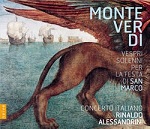 Don’t
get too excited: this is not a newly-discovered work but a hypothetical
reconstruction of how Monteverdi’s music might have been performed on
Venice’s patronal festival, St Mark’s Day, employing a conflation of
parts of his Vespers of 1610 and the Selva morale e spirituale of 1640, with three interpolations, of works by Giovanni Gabrieli, Francesco
Usper and Giovanni Battista Buonamente. It also marks the beginning
of a planned complete recording of the Selva morale.
Don’t
get too excited: this is not a newly-discovered work but a hypothetical
reconstruction of how Monteverdi’s music might have been performed on
Venice’s patronal festival, St Mark’s Day, employing a conflation of
parts of his Vespers of 1610 and the Selva morale e spirituale of 1640, with three interpolations, of works by Giovanni Gabrieli, Francesco
Usper and Giovanni Battista Buonamente. It also marks the beginning
of a planned complete recording of the Selva morale.
I enjoyed hearing this reconstruction but most serious Monteverdians
will want the full Vespers – recordings by Andrew Parrott (budget-price
Erato/Virgin Veritas 5616622) and Robert King (Hyperion CDA67531/2)
top a list of strong recommendations for me – and at least a substantial
selection from the Selva morale such as the 3-CD set from Cantus
Cölln, Concert Palatino and Konrad Junghänel on Harmonia Mundi HMC901718/20,
available to download in mp3 and lossless formats from eclassical.com,
but wait till 15 September 2014 and it can be yours on a budget-price
reissue, HMY2921718/20 for around £13 or less, which rather dampens
the ardour of the hopeful seller asking £251.90 on Amazon UK. If you
can’t wait that long, you can stream from Naxos Music Library or Qobuz.
Members can download the 3-disc set in CD quality from Qobuz for £6.39.
I made Volume 2 of The Sixteen’s complete recording of the Selva
morale my Download of the Month in May
2012/1. At that time Volume 1 (COR16087) had not yet been
released in lossless sound by Coro’s digital shop, thesixteendigital.com,
but it has since –here – as has the third and final volume ( COR16109) – here.
The Sixteen also made a fine recording of the 4-part Mass first published
in 1650 and the Missa In illo Tempore from the 1610 collection:
Hyperion budget-price HeliosCDH55145 – review – and a putative arrangement ofVespers for the Feast of St Barbara (Hyperion CDA66311/2 – archive service only or download in
mp3 or lossless from hyperion-records.co.uk).
I must also mention the other volumes of Monteverdi’s sacred music which
Robert King and his King’s Consort recorded for Hyperion in addition
to the Vespers: CDA67428, 67438, 67487 and CDA67519 –
for the two last see March
2012/1 – and the wonderful selection recorded for the same label
by Emma Kirkby et al, and now at budget price on CDH55345
– from hyperion-records.co.uk.
It would take a whole full-length review to do justice to all these
Coro and Hyperion recordings so for the moment I’ll simply say that
they are all excellent.
Purchasers of the Naïve CD also receive a bonus DVD of a film by Claudio
Rufa about Alessandrini performing Monteverdi. Given that you can find
the CD online for around £11, not a huge amount more at current exchange
rates than eclassical.com’s $14.33, you may prefer to follow that route.
The Guerra Manuscript, Volume 3
Juan HIDALGO (1614-1685) Disfrazado de pastor [4:26]
De las luces que en el mar [5:05]
Anon Al aire, lisonjas [4:48]
Giovanni Girolamo KAPSBERGER (c.1580-1651)/José MARÍN (1619-
1699)
Pasacaglia – Qué dulcemente suena [6:53]
Anon La más bella ninfa [5:59]
Juan HIDALGO Sólo es querer [4:50]
Anon Ayer, zagales, bajé [3:58]
José MARÍN Pues así mis cuidados [5:02]
Filis, no cantes [3:09]
Van y vienen mis pensamientos [4:26]
Anon No lloréis, mi Celia [5:11]
Ojos para el llanto [4:50]
Vuelve, Amarilis divina [3:15]
Juan del VADO (c.1625-1691) Desmayado el aliento [8:21]
Anon Una niña pregonó [3:59]
Yetzabel Arias Fernández (soprano)
Ars Atlántica (Santi Mirón (viols); Eligio Luis Quinteiro (baroque
guitar and theorbo); Manuel Vilas (Spanish baroque harp)
rec. Church of San Vicente de Pombeiro, Ferreira de Pantón, Lugo, Spain,
5-7 May, 2010, during the Via Stellæ Festival.
pdf booklet included. Spanish sung texts and English translations can
be accessed at www.naxos.com/libretti/573312.htm
NAXOS 8.573312 [74:11] – from classicsonline.com (mp3) or stream from Naxos Music Library or Qobuz.

Manuel Vilas is the pivotal point of the three volumes of this series
of recordings of music from the late 17th-century Spanish
Guerra Manuscript, encompassing the finest music of the period. With
a few small grumbles, I enjoyed Volume 1 in which he accompanies Isabel
Monar (soprano) ( 8.570135 – July
2011/1: NB correct catalogue number) and Johan van Veen made Volume
2, with Juan Sancho (tenor) and Ars Atlántica a Recording of the
Month (8.572876 – review).
The music calls for a powerful voice and Yetzabel Fernández fits the
bill as well as her predecessors. Nor is there any sense that the third
selection from the manuscript is scraping the bottom of the barrel.
I listened to the lossless streamed version from Qobuz and the mp3 from
classicsonline.com and both sound very well, with, as expected a small
but significant advantage in openness to the former.
 Discovery of the Month
Discovery of the Month
Tickle the Minikin : 17th-century lyra-viol music
Thomas MACE (1612/13-c.1706), Simon IVES (1600-1662), Charles COLEMAN
(1602-1664) and John TAYLOR (dates?) Pieces in Harpe Sette
Sharpe [14:36]
John JENKINS (1592-1678) and William YOUNG (d.1662) Pieces
in ‘ededf’ [5:19]
Anonymous Pieces in Lancashire Pipes Tuning [4:51]
John JENKINS Pieces in French Sette [9:51]
Anonymous, John JENKINS and Dietrich STEFFKINS (c.1600-1673) Pieces in High Harp Flat [12:28]
Pieces in ‘fedef’ [2:55]
Alfonso Waye Tuning : Jemmye [5:39]
Anonymous, John JENKINS, John ESTO (dates?), Simon IVES and Williams
YOUNG Pieces in Harpe Sette Flat [8:45]
Robert Smith (lyra-viol)
pdf booklet included
RESONUS RES10132 [64:34] – download only (no CD equivalent)
from resonusclassics.com (mp3, aac, 16- and 24-bit lossless) or eclassical.com (mp3, 16- and 24-bit lossless) or sample from Qobuz
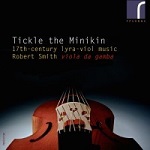 Viola
da gambist Robert Smith, here making his solo recording debut with a
fascinating programme of 17th-century works for lyra viol has already
recorded for Resonus – he’s a founder member of the acclaimed Baroque
trio Fantasticus. (Baroque Chamber Works, RES10112 – 2012/2; Sonnerie and other portraits, RES10122 – 2013/14)
Employing his own new editions, the majority of his recital is from
English composers and taken from a manuscript collection in the British
Library. I won’t go into detail because the Resonus booklet is free
to all-comers from any of the links that I’ve given. The only comparable
recording that I know comes from Jordi Savall on various treble viols,
and that’s of slightly later Celtic material – review.
Viola
da gambist Robert Smith, here making his solo recording debut with a
fascinating programme of 17th-century works for lyra viol has already
recorded for Resonus – he’s a founder member of the acclaimed Baroque
trio Fantasticus. (Baroque Chamber Works, RES10112 – 2012/2; Sonnerie and other portraits, RES10122 – 2013/14)
Employing his own new editions, the majority of his recital is from
English composers and taken from a manuscript collection in the British
Library. I won’t go into detail because the Resonus booklet is free
to all-comers from any of the links that I’ve given. The only comparable
recording that I know comes from Jordi Savall on various treble viols,
and that’s of slightly later Celtic material – review.
Some of the music here has been performed before – there are recordings
of John Jenkins’ viol music on Atma, Naxos and Somm – but by a viol
or mixed consort. To keep our interest with a single instrument, albeit
that the lyra viol is essentially a one-man band, is a tougher ask –
even Savall needed Andrew Lawrence-King’s harp accompaniment – and I
have to admit that I wasn’t enthralled throughout. Overall, however,
playing of this quality cannot fail to delight, especially when it’s
so well recorded.
Nun komm, der Heiden Heiland
Dietrich BUXTEHUDE (c.1637-1707) Prelude in g minor, BuxWV149
[9:01]
Ornamented chorale on Nun komm, der Heiden Heiland, BuxWV211
[2:12]
Nicolaus BRUHNS (1665-1697) Fantasia on chorale Nun komm,
der Heiden Heiland [10:03]
Prelude in e minor [9:16]
Johann Sebastian BACH (1685-1750)
Trio Chorale Kommst du nun Jesu, vom Himmel herunter auf Erden, BWV650
[3:45]
Toccata, adagio and fugue, BWV564 [6:04 + 4:49 + 5:16]
Ornamented chorale Nun komm, der Heiden Heiland, BWV659 [4:51]
Chorale Nun komm, der Heiden Heiland [0:57]
Chorale Nun komm, der Heiden Heiland, BWV599 [1:14]
Dietrich BUXTEHUDE Ornamented chorale on Puer natus in Bethlehem,
BuxWV217[1:09]
Benoit Dumon (organ, counter-tenor)
pdf booklet includes organ specification
rec. Quoirin organ, Sainte Marguerite, Marseille, 24-25 January 2014.
DDD
PARNASSIE PAR62 [58:37] – stream and purchase (mp3, 16- and 24-bit
lossless) from Qobuz
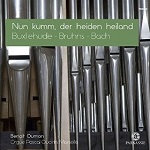 At
first glance a French organ would not seem appropriate for North German
baroque music, but this 17th-century instrument, rebuilt
by Pascal Quorin in 2003, is ideal for the repertoire, with a bright,
clear sound. Benoit Dumon is an organist, counter-tenor and choirmaster.
This is his first recording as organist and it’s very successful. I’ve
given the Qobuz link but you can also find samples on Dumon’s website here.
At
first glance a French organ would not seem appropriate for North German
baroque music, but this 17th-century instrument, rebuilt
by Pascal Quorin in 2003, is ideal for the repertoire, with a bright,
clear sound. Benoit Dumon is an organist, counter-tenor and choirmaster.
This is his first recording as organist and it’s very successful. I’ve
given the Qobuz link but you can also find samples on Dumon’s website here.
Could this be the finest French exponent of North German organ music
since Marie-Claire Alain, whose 2-CD set of Buxtehude’s organ music
was recently reissued on a budget-price Warner Apex release (2564651790)?
I listened to Alain’s recordings of BuxWV149 and 211 alongside Dumon’s
and there’s very little to choose. Alain is a little more nimble in
BuxWV149 but there’s never any sense that Dumon allows the music to
drag; if she brings out the music’s brilliance slightly better, he is
a little more persuasive in the more reflective sections. As the Warner
is so inexpensive – around £6.50 – I’d suggest that anyone who falls
in love with Buxtehude’s organ music from the three pieces here would
do well to go on to purchase that too. Alternatively there’s the Lionel
Rogg twofer on Gemini which I made Bargain of the Month – review.
That CD set seems to be out of stock wherever I looked but you can download
from sainsburysentertainment.co.uk in 320 kb/s mp3 for £5.99.
Those wishing to go the whole hog will be interested to know that René
Saorgin’s 5-disc set of Buxtehude organ works for Harmonia Mundi, though
apparently deleted on CD, is available for streaming from Qobuz and for download from eclassical.com (both mp3 and lossless) – the latter, at $60.69 more expensive than
the former at €24.99. Also stream from Naxos Music Library or download
from classicsonline.com,
mp3 only, for £39.95. Saorgin, like Dumon and Alain, opens proceedings
with BuxWV149: of three first-rate performances I’d just choose his
version for my Desert Island, as blending the virtues of Alain and Dumon.
With good recording – I listened to the lossless version of the Parnassie,
which sounds at least as good as the Warner CD – this would be especially
worth investigating by someone fairly new to the baroque organ repertoire
who wanted to follow the progression of the stylus phantasticus from two of Bach’s important predecessors to the man himself but it’s
valuable for the rest of us, too. The programme is especially appropriate
for Advent – a long way off when I reviewed this in late July – but
that shouldn’t prevent us from enjoying it all year round.
Parnassie need to sharpen up their act as far as the English notes are
concerned. The last time that I saw English as fractured as this was
on Supraphon, circa 1962, or from DG who used to inform purchasers that
‘there are special clothes [sic] for cleaning this record’. As a sample:
‘[Buxtehude] was probably educated by his father but this remains total
fuzziness’. That sounds as if someone put sa formation demeure assez
floue into the computer and out came the answer. Nor will you make
much of the note on BWV564: ‘First score’s terms of the Toccata remind
the free writing style of “stylus phantasticus”’. (recte ‘The
opening passages of the Toccata remind us of …’) More ‘fuzziness’ there,
I think. There’s some linguistic misunderstanding, too, in labelling
track 9 – in the English notes, not in the French – as Nun komm des [recte: der] Heiden Heiland.
 Discovery of the Month
Discovery of the Month
Alessandro STRADELLA (1639- 1682)
La Forza delle Stelle ovvero Il Damone
Nora Tabbush (soprano), Claudia Di Carlo (soprano), Raffaele Pè (contralto),
Maurizio Dalena (tenor), Mauro Borgioni (bass)
Ensemble Mare Nostrum/Andrea De Carlo
rec. Church of San Bartolomeo, Nepi, Italy, September 2013. DDD
world première complete recording
booklet with texts included
ARCANA A377 [49:54] – due for release on 22 September
2014.
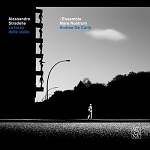 Though
this recording is not available on CD till late September – probably
the download will be out a little earlier – I just had to fit this review
in. We already knew from his oratorio San Giovanni Battista what fine sacred music Stradella could write (Hyperion CDA67617 - review).
Performances of this delightful secular cantata, with words by Queen
Christina of Sweden, are all that could be wished and the release comes
with authoritative booklet notes. The only available download was Outhere’s
press preview at 192 kb/s, which is not
Though
this recording is not available on CD till late September – probably
the download will be out a little earlier – I just had to fit this review
in. We already knew from his oratorio San Giovanni Battista what fine sacred music Stradella could write (Hyperion CDA67617 - review).
Performances of this delightful secular cantata, with words by Queen
Christina of Sweden, are all that could be wished and the release comes
with authoritative booklet notes. The only available download was Outhere’s
press preview at 192 kb/s, which is not  ideal
but leads me to believe that the finished product, recorded in Stradella’s
home town of Nepi, will sound fine when it becomes available in lossless
sound, as I presume it will from emusic.com.
ideal
but leads me to believe that the finished product, recorded in Stradella’s
home town of Nepi, will sound fine when it becomes available in lossless
sound, as I presume it will from emusic.com.
While you’re waiting for the Arcana, emusic.com offer Fuor della Stigia sponda and other cantatas by Stradella
on an equally enjoyable Harmonia Mundi recording: HMU907192 –
Christine Brandes (soprano), Paul O’Dette (archlute and baroque guitar),
Mary Springfels (gamba), Ingrid Matthews (violin) and Barbara Weiss
(harpsichord and organ) – in mp3 or lossless, no booklet. Also available
for streaming fromNaxos
Music Library or Qobuz but no longer generally available on CD.
Juan Baustista José (Joan Baptista Josep) CABANILLES (1644-1712)
Tiento de cuarto tono de mano derecha (con un pedazo de dos
tiples) [7:50]
Tiento de falsas [2:49]
Pasacalles [4:14]
Tiento de primer tono de mano izquierda [8:05]
Paseo [2:39]
Tiento lleno de quinto tono por Bequadrado [7:53]
Xácara [5:07]
Tiento de segundo tono por Gesolreut [6:02]
Tiento de primer tono [4:51]
Tiento de falsas de octavo tono [4:43]
Tiento de batalla de octavo tono [8:03]
John Butt (organ)
rec. c.1990. DDD
HARMONIA MUNDI 907047 [62:16] – from eclassical.com (mp3 and lossless)

There are more variants of Cabanilles’ forenames than you can
shake a stick at – even his surname exists in various spellings. Along
with Francisco Correa de Araujo he is regarded as the finest Spanish
baroque composer. John Butt plays a representative selection of his
organ music – mostly tientos – on an instrument by Greg Harrold
in the early-18th-century Spanish style from the O’Neill
collection in the University of California.
The performances are persuasive and the recording is good but there’s
no booklet and in the final analysis I’d have preferred to have heard
a genuine Hispanic instrument with some characteristically more raucous,
and usually slightly out of tune, stops.
Marc-Antoine CHARPENTIER (1643-1704)
La Couronne de Fleurs, H486 [26:07]
La Descente d’Orphée aux Enfers, H488 [52:35]
Aaron Sheehan (tenor), Teresa Wakim (soprano), Amanda Forsythe (soprano),
Jesse Blumberg (baritone)
Boston Early Music FestivalVocal and Chamber Ensembles, Paul O’Dette
and Stephen Stubbs
rec. Sendesaal Bremen, Germany, July 2013. DDD
pdf booklet with texts and translations included
CPO 7778762 [79:11] – from eclassical.com (mp3 and lossless) or stream from Naxos
Music Library
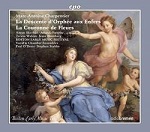 The
William Christie recording of La Descente d’Orphée with Les Arts
Florissants (Erato 0630119132) used to be one of the great bargains
of the baroque catalogue when it was bundled with three other recordings
of music of the period and sold for about the price of one full-price
CD. That’s no longer the case but as a download it can be yours for
£2.99 from amazon.co.uk .
The
William Christie recording of La Descente d’Orphée with Les Arts
Florissants (Erato 0630119132) used to be one of the great bargains
of the baroque catalogue when it was bundled with three other recordings
of music of the period and sold for about the price of one full-price
CD. That’s no longer the case but as a download it can be yours for
£2.99 from amazon.co.uk .
The new recording is more expensive but comes in lossless sound as well
as mp3, with the libretto, and coupled with the equally beautiful but
less well known La Couronne de Fleurs. With very little to choose
between performances, cost on the one hand and better-quality recording
plus the extra work and the libretto on the other can safely be left
as deciding factors.
Heinrich Ignaz Franz BIBER (1644-1704)
Mystery Sonatas ‘Rosary Sonatas’ (c.1676)
Sirkka-Liisa Kaakinen-Pilch (violin)
Battalia (Annamari Pölhö (keyboards), Eero Palviainen (lutes, guitar,
organ), Mika Suihkonen, violone)
rec. Karjaa Church (Karjaan Pyhän Katariinan Kirkko), Finland, August
2013. DDD
pdf booklet included
ODE12432D [2 CDs: 2:03:23] – from eclassical.com (mp3 and lossless)
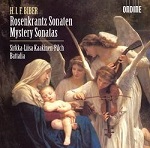 Several
recordings of these intriguing sonatas have come across my path over
the years and this is one of the best. You’ll find some information
about the music in my review of a recording on the Maya label which I compared with a Virgin budget
twofer in 2007. I thought the Maya recording (MCD0603) unlikely
to disappoint but tended towards the Virgin set, not least because of
its availability at a lower price.
Several
recordings of these intriguing sonatas have come across my path over
the years and this is one of the best. You’ll find some information
about the music in my review of a recording on the Maya label which I compared with a Virgin budget
twofer in 2007. I thought the Maya recording (MCD0603) unlikely
to disappoint but tended towards the Virgin set, not least because of
its availability at a lower price.
The Ondine CDs sell for little more than £10 from some dealers, making
them competitive even with the Virgin twofer (5620622), which
means that eclassical.com’s asking price of $22.21 is, unfortunately,
uncompetitive, at least for UK purchasers. As so often happens, crazy
economics means that Amazon UK are asking more for their mp3 download
than for the CDs – and even more than the eclassical.com price for lossless
at the rate of exchange when I did the sums.
Eclassical.com also have the Andrew Manze set of these sonatas (Harmonia
Mundi HMU907321.22 – review)
and their asking price of $25.41 is (just) competitive with the CD set,
though it comes without any booklet.
António TEIXEIRA (1707-c1759) Te Deum
Lynda Russell, Gillian Fisher (sopranos); Catherine Denley, Catherine
Wyn-Rogers (altos); William Kendall, Andrew Murgatroyd (tenors); Michael
George, Peter Harvey (basses)
The Sixteen,
The Symphony of Harmony and Invention/Harry Christophers
rec. St. Jude on the Hill, Hampstead Garden Suburb, London, c.1991.
DDD
pdf booklet with text and translation included
CORO COR16009 [79:41] – from thesixteendigital.com (mp3, aac and lossless) or stream from Naxos
Music Library

I’m pleased to see that Coro are gradually adding their older recordings
to the digital shop alongside the new releases: they were already available
in mp3 from classicsonline.com but the option of digital flac or alac
for not much more is an advantage. This Teixeira Te Deum, composed
for the New Year celebrations in 1734 and still the only recording of
the work, dates from some time ago, from The Sixteen’s involvement with
the defunct Collins Classics label. The booklet gives only the place
of the recording, not the date, so I can give you only an approximation
for the latter.
The music and performance have received so much praise over the years
– Peter Wells was almost alone in having some reservations – review – that I need only add that the lossless recording sounds well, though
benefiting from a volume boost.
Christoph Willibald GLUCK (1714-1787)
Orfeo ed Euridice (1762 edition) [90:32]
Orfeo - Bernarda Fink (mezzo)
Euridice - Veronica Cangemi (soprano)
Amore - Maria Cristina Kiehr (soprano)
Rias-Kammerchor
Freiburger Barockorchester/René Jacobs
rec. Teldec Studio, Berlin, January 2001. DDD
pdf booklet with text and translations included
HARMONIA MUNDI HMC901742/3 [90:32] – from eclassical.com (mp3 and lossless)
 The
textual history of Gluck’s Orfeo is somewhat complicated: the
Italian-texted version performed in Vienna in 1762 with counter-tenor
hero, a revised version for Parma in 1769, the French-texted Orphée
et Eurydice of 1774 with a high tenor and extra dance music to appeal
to Parisian taste, a conflated version arranged by Berlioz and a compromise
employing the Italian original with the extra dance music from the French
version. If you are looking for such a compromise version, Peter Maag’s
recording on Arts Blue Line comes in CD and SACD formats (47753-2: review and 47753-8: review and review).
The
textual history of Gluck’s Orfeo is somewhat complicated: the
Italian-texted version performed in Vienna in 1762 with counter-tenor
hero, a revised version for Parma in 1769, the French-texted Orphée
et Eurydice of 1774 with a high tenor and extra dance music to appeal
to Parisian taste, a conflated version arranged by Berlioz and a compromise
employing the Italian original with the extra dance music from the French
version. If you are looking for such a compromise version, Peter Maag’s
recording on Arts Blue Line comes in CD and SACD formats (47753-2: review and 47753-8: review and review).
If you are looking for the earliest form of the opera, a single-CD Naxos
recording could well be the answer: Arnold Östman with a period ensemble
on Naxos 8.660064. That means forfeiting the Dance of the
Blessed Spirits and Dance of the Furies, both familiar as
orchestral lollipops, but results in a more sharply-sculpted opera and
the same is true of this Jacobs version on Harmonia Mundi.
If you must have a counter-tenor Orfeo, you could do much worse than
John Eliot Gardiner’s 1991 Decca recording or Sigiswald Kuijken’s on
Accent (ACC30023), both of which I reviewed in February
2010. The passionato link to the Decca no longer applies and the
catalogue number now is 4783425, with a download from 7digital.com . It’s also available as part of a 15-CD set of Gluck
operas on 4786899.
Joseph HAYDN (1732-1809)
Symphony No.90 in C [31:15]
Symphony No.92 in G ‘Oxford’ [30:11]
Heidelberg Symphony Orchestra/Thomas Fey
rec. May 2011 and September 2010. DDD
pdf booklet included
HÄNSSLER 98.629 [61:26] – from classicsonline.com (mp3) or stream fromNaxos
Music Library or Qobuz
Symphony No.90 in C [26:27]
Symphony No.91 in E flat [26:20]
Symphony No.92 in G ‘Oxford’ [25:17]
Hanover Band/Roy Goodman
pdf booklet included
HYPERION HELIOS CDH55125 [78:04] – from hyperion-records.co.uk (mp3 and lossless)
Symphony No.98 in B flat [26:21]
Symphony No.103 in E flat ‘Drum Roll’ [32:24]
Heidelberg Symphony Orchestra/Thomas Fey
rec. September and October 2013. DDD
pdf booklet included
HÄNSSLER 98.031 [58:45] – from classicsonline.com (mp3) or stream from Naxos
Music Library

 I
mentioned all these recordings in my review of the excellent new Colin Davis/LSO Live set of the ‘Oxford’ and ‘London’
symphonies, which appeared as a two-hander with John Quinn’s. Fey’s
series has won praise and brickbats in about equal numbers – often his
performance of a particular symphony will seem to be going swimmingly
until he spoils the effect with a very noticeable gear-change. In Nos.
90 and 92, however, the virtues largely outweigh the few problems, with
Fey’s application of period practice to a modern orchestra producing
pleasing effects.
I
mentioned all these recordings in my review of the excellent new Colin Davis/LSO Live set of the ‘Oxford’ and ‘London’
symphonies, which appeared as a two-hander with John Quinn’s. Fey’s
series has won praise and brickbats in about equal numbers – often his
performance of a particular symphony will seem to be going swimmingly
until he spoils the effect with a very noticeable gear-change. In Nos.
90 and 92, however, the virtues largely outweigh the few problems, with
Fey’s application of period practice to a modern orchestra producing
pleasing effects.
Nos. 98 and 103 come on the latest volume (No.22) in the Hänssler series.
If you have been collecting Fey’s performances, you will know what to
expect; otherwise it might be wise to sample first from Naxos Music
Library – it hadn’t yet appeared on Qobuz when I checked, but doubtless
it will. The trademark prominent timpani are much in evidence, especially
in the first movement of No.103, known as mit dem Paukenwirbel or Drumroll. (Confusingly, No.94, known as the Surprise in English, is mit dem Paukenschlag, ‘with the drum-stroke’ in
German). The joke whereby the keyboard at which Haydn would have directed
the performances, virtually inaudibly, gets a little passage all to
itself at the end of 98 – spoiled in some versions by assigning the
passage to a solo violin – is observed but either Fey or the engineers
make it sound too backward in coming forward. Otherwise, as with Nos.
90 and 92, these are two of the most enjoyable performances in Fey’s
variable series.

Unless you insist on all the repeats, as Fey does – I’m easy either
way – better value is to be found on the Hyperion album, with three
symphonies in informed and stylish but not pedantic period-instrument
performances, well recorded and all on offer at budget price. There’s
the merest hint of a harpsichord in the background, so it’s a shame
that Goodman never recorded No.98 with its joke keyboard part at the
end of the finale – like a similar set from Christopher Hogwood for
Oiseau Lyre, the remnants of which are available for download – see
review of Nos. 94 and 96 in 2014/8 – it fell by the wayside.
I’ve already recommended Goodman’s recordings of Nos. 93-95 (CDH55126)
and 101-102 (CDH55127) in January
2011 and November
2011/1.
Wolfgang Amadeus MOZART (1756-1791)
Piano Concerto No.19 in F, K459 [28:38]
Piano Concerto No.18 in B-flat, K456 [32:09]
Cleveland Orchestra/Mitsuko Uchida (piano)
rec. live Severance Hall, Cleveland, Ohio, 1-5 April, 2014. DDD
DECCA 4786763 [60:47] – from 7digital.com (mp3) or stream from Qobuz with booklet.
 Not
so long ago it would have been fairly easy to have done a comparative
review of either of these concertos; now there are over 50 recordings
of No.19 alone in the UK catalogue, so I’ve limited comparisons to Alfred
Brendel, with the Academy of St Martin in the Fields and Neville Marriner
in a 12-CD box set (4782695) or on a budget twofer (Decca 4422692,
No.19 with Nos.20, 21, 23, 24 and Rondos K382 and K386 – reviewed 2012/14).
For No.18 my comparison has been with Imogen Cooper directing the Northern
Sinfonia (Avie AV2200 – review),
leaving Ronald Brautigam and Die Kölner Akademie/Michael Willens hors
de concours, not because I share the extremely prejudiced criticism
that this series has encountered in one quarter, but because its appeal
is chiefly to lovers of period instruments.
Not
so long ago it would have been fairly easy to have done a comparative
review of either of these concertos; now there are over 50 recordings
of No.19 alone in the UK catalogue, so I’ve limited comparisons to Alfred
Brendel, with the Academy of St Martin in the Fields and Neville Marriner
in a 12-CD box set (4782695) or on a budget twofer (Decca 4422692,
No.19 with Nos.20, 21, 23, 24 and Rondos K382 and K386 – reviewed 2012/14).
For No.18 my comparison has been with Imogen Cooper directing the Northern
Sinfonia (Avie AV2200 – review),
leaving Ronald Brautigam and Die Kölner Akademie/Michael Willens hors
de concours, not because I share the extremely prejudiced criticism
that this series has encountered in one quarter, but because its appeal
is chiefly to lovers of period instruments.

Mitsuko Uchida’s own earlier performances with ECO/Jeffrey Tate are
also available on Decca Duos: No.18 on 4733132, with 9, 14, 15,
17 and Rondo, K382, and No.19 on 4685402, with 20-23. Let me
simply say that I think she outdoes even her previous successes and
holds her own against all comers. Even in mp3 the sound is good and
better still in lossless quality.
Having mentioned Ronald Brautigam’s recording of Nos.18 and 22 on the
fortepiano, I should add that, like its predecessors in the series –
it’s the sixth to date – it continues to offer period performance without
the pain. (BIS-SACD-2044 – download in mp3, 16- or 24-bit lossless
fromemusic.com or stream from Naxos Music Library or Qobuz:
all include the booklet).
Jan Ladislav DUSSEK (1760-1812)
Piano Concerto in G, Op.1/3 [14:19]
Piano Concerto in C, Op.29 [23:29]
Piano Concerto in E flat, Op.70 [30:31]
Ulster Orchestra/Howard Shelley (piano)
rec. September 2013. DDD
pdf booklet included
HYPERION CDA68027 [68:19] – from hyperion-records.co.uk (m3, 16- and 24-bit lossless)
 Hot
on the heels of Hyperion’s Romantic Piano Concerto Series comes the
first of a new collection of Classical Concertos featuring lesser-known
composers of the period. The first of these composers, recorded here,
is Jan Ladislav Dussek, who wrote much music for the piano and was a
great virtuoso pianist of the time. His eighteen piano concertos are
his only orchestral works and they are always characterised by liveliness,
tunefulness and charm, but with touches of pathos and unexpected harmonic
twists now and then. Some of these features are apparent in the Opus
1/3 Concerto, the first piece presented on this disc. This is a youthful
piece in classical style but his only concerto to omit the slow movement.
The piece reminds us of Mozart, both in style and in musical form or
shape. Howard Shelley, as ever, is fleet of foot, light in touch and
clear in articulation, very necessary in this kind of music. There is
a bravura cadenza, a feature which Dussek only adopted early in his
career.
Hot
on the heels of Hyperion’s Romantic Piano Concerto Series comes the
first of a new collection of Classical Concertos featuring lesser-known
composers of the period. The first of these composers, recorded here,
is Jan Ladislav Dussek, who wrote much music for the piano and was a
great virtuoso pianist of the time. His eighteen piano concertos are
his only orchestral works and they are always characterised by liveliness,
tunefulness and charm, but with touches of pathos and unexpected harmonic
twists now and then. Some of these features are apparent in the Opus
1/3 Concerto, the first piece presented on this disc. This is a youthful
piece in classical style but his only concerto to omit the slow movement.
The piece reminds us of Mozart, both in style and in musical form or
shape. Howard Shelley, as ever, is fleet of foot, light in touch and
clear in articulation, very necessary in this kind of music. There is
a bravura cadenza, a feature which Dussek only adopted early in his
career.
The second concerto on this disc comes from Dussek’s middle period.
The concerto begins with a slow introduction, perhaps the first concerto
to do so, maybe under the influence of Haydn’s London Symphonies which
Dussek would have heard during his time in that city. However Howard
Shelley keeps this Larghetto moving, and it is soon followed
by a the lively Allegro maestoso, characterfully and idiomatically
played by the orchestra. Our soloist’s first entry is certainly maestoso in spirit and this gradually develops into virtuosic runs. He plays
the slower themes tenderly, and although there is no cadenza, the soloist
is provided with plenty of opportunities for brilliant display. The Larghetto slow movement finds Shelley drawing a rich tone from
his piano, and he phrases Dussek’s attractive melodies sensitively.
The ensuing Rondo is charmingly played with delicacy and clean
articulation.
Written in 1810, the same year as Beethoven’s Emperor Concerto, also
in the key of E flat major, Dussek’s Concerto Opus 70 has many novel
features. Very different from the Beethoven in style it begins with
a lyrical melody, generously played by the orchestra, but this soon
generates fast and vigorous passages. After the return of this melody,
the piano enters rather more quickly with a newly developed theme beginning
with solid bravura chords. One orchestra chord I noticed was
not quite together with the piano, but never mind, everything is beautifully
and cleanly played. I really like Shelley’s sparkling passagework as
well as his subtle rubato as his he moves from section to section.
The soloist presents several new themes not previously heard in the
orchestra, and one of the slower ones is very romantically played and
beautifully phrased by Howard Shelley. The unexpected key shift towards
the end is really telling and certainly adds to the drama here.
The charming second movement Adagio ma non troppo lento gives
opportunities for the strings and winds of the Ulster Orchestra to shine.
Sometimes the pianist weaves delicate arabesques around the melodies
in the winds or strings, and these seem to be effortlessly tossed off
by Howard Shelley. The finale is a gentle and tuneful Rondo,
bringing the work to a happy conclusion.
Having known much of Dussek’s piano solo and duet music for a long time,
it was interesting to hear three of his piano concertos from different
periods of his composing life. His music may not have the sublime depth
of a Mozart or Beethoven, but it is nevertheless very attractive, refreshing
and enjoyable to listen to, especially when it is as well played as
it is on this Hyperion release. Howard Shelley and his musicians give
fine and  sparkling
performances of these pieces and the recording is of the usual high
standard we have come to expect from this label. The programme notes
by Stephan D Lindeman are informative and well written.
sparkling
performances of these pieces and the recording is of the usual high
standard we have come to expect from this label. The programme notes
by Stephan D Lindeman are informative and well written.
Geoffrey Molyneux
This is the only recording of these three concertos and there is only
one other album of Dussek piano concertos currently available: in g
minor, Op.49, and in B-flat, Op.42, with the tableau ‘Marie Antoinette’,
Op.23, performed by Andreas Staier (fortepiano) and Concert Köln on
Capriccio C5072 – in mp3 and lossless from eclassical.com.
See review by Byzantion. (BW)
Marcos António PORTUGAL (1762–1830)
Vésperas de Nossa Senhora in C, P02.31, including Magnificat,
P02.24 (c.1824) [36:24]
Missa a quatro in F, p01.13 (c.1804) [41:36]
Ensemble Turicum (Reto Hofstetter, Frédéric Gindraux, Christophe Gindraux,
Matthias Müller (tenors); Luiz Alves da Silva, Marcus Niedermeyr, Robert
Braunschweig (baritones); Michael Leibundgut, Grzegorz Rozycki (basses);
Mathias Weibel, Mario Huter, Stefano Mariani, Laura Chmelevsky (violas);
Marlise Goidanich (cello); Matthias B. Frey (violone); Margarete Kopelent
(organ); Emanuele Forni (guitar))/Mathias Weibel and Luiz Alves da Silva
(joint directors)
First recordings
rec. live in concert, Kirche St Peter, Zurich, 27 September 2013, during
the Festival Alte Musik Zürich. DDD
pdf booklet with texts and translations included
TOCCATA CLASSICS TOCC0238 [78:00] – from classicsonline.com (mp3 and lossless) or toccataclassics.com (mp3 and lossless) or stream from Naxos Music Library or Qobuz
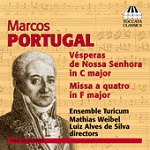 Yet
another discovery from Toccata: I’m indebted to this recording and the
booklet of notes for everything that I now know about Marcos António
Portugal and his music. Not only are these recording premieres, this
album adds considerably to Portugal’s representation in the catalogue: Missa Grande from Chœur L’Échelle on Paraty (PTY312214 – download from eclassical.com,
mp3, 16- and 24-bit lossless, or stream from Qobuz),
Christmas Matins of 1811 (Matinas do Natal, PTY209108 – fromclassicsonline.com,
mp3, or stream from Naxos Music Library or Qobuz),
a Marco Polo recording of his opera Le Donne cambiate (8.225154 – download only) and a short filler on a Naxos recording of Arriaga’s
Symphony in D, the overture to Il Duca di Foix (8.557207 – review).
Yet
another discovery from Toccata: I’m indebted to this recording and the
booklet of notes for everything that I now know about Marcos António
Portugal and his music. Not only are these recording premieres, this
album adds considerably to Portugal’s representation in the catalogue: Missa Grande from Chœur L’Échelle on Paraty (PTY312214 – download from eclassical.com,
mp3, 16- and 24-bit lossless, or stream from Qobuz),
Christmas Matins of 1811 (Matinas do Natal, PTY209108 – fromclassicsonline.com,
mp3, or stream from Naxos Music Library or Qobuz),
a Marco Polo recording of his opera Le Donne cambiate (8.225154 – download only) and a short filler on a Naxos recording of Arriaga’s
Symphony in D, the overture to Il Duca di Foix (8.557207 – review).
The Vespers of Our Lady open with a Sonata in G and the Mass with the
Sinfonia in D from the opera Artaserse. The settings of the
Vespers psalms and Magnificat are in a very theatrical style
– not surprisingly, since Portugal was best known for his many operas,
we might well be listening to the arias and choruses of a Cimarosa or
Rossini opera. The Mass, though in a slightly less markedly operatic
style, still bears the hallmark of a composer of operas. Both performances
are more than good enough to make us wonder why these two works have
not been recorded before and the recording is good, especially as heard
in lossless sound from Qobuz. (Disappointingly, classicsonline.com
supplied only the mp3 version.)
 One
of the glories of the Paraty recording of the Missa Grande (P01-09, c.1782-90) music in a rather more traditional style than that
in F on Toccata – not too far removed in style from the Masses of Haydn
and Mozart – is the historic Cuenca Cathedral Epistle organ, the specification
of which is included in the booklet, heard to advantage in the opening Intento No.7 by Dom Melchior López (1759-1822), a work here receiving
its first ever recording, and his Intento No.4, played at the
Communion. The organ makes more than a fine substitute in this version
for basso continuo, itself replacing the orchestral original.
The programme is rounded of by Quetzal by the contemporary composer
Caroline Marçot, another first recording. Brunco Procopio directs Portugal’s
music while Charles Barbier directs the plainsong propers for the feast
of Santa Barbara. Even if the performances were not recommendable,
this would be well worth hearing as the only recording of a fine work.
As it is, they do the music justice and the recording is very good;
the 24-bit from eclassical.com just surpasses the 16-bit lossless stream
from Qobuz but at something of a premium ($20.25 against $13.50 for
mp3 and 16-bit lossless).
One
of the glories of the Paraty recording of the Missa Grande (P01-09, c.1782-90) music in a rather more traditional style than that
in F on Toccata – not too far removed in style from the Masses of Haydn
and Mozart – is the historic Cuenca Cathedral Epistle organ, the specification
of which is included in the booklet, heard to advantage in the opening Intento No.7 by Dom Melchior López (1759-1822), a work here receiving
its first ever recording, and his Intento No.4, played at the
Communion. The organ makes more than a fine substitute in this version
for basso continuo, itself replacing the orchestral original.
The programme is rounded of by Quetzal by the contemporary composer
Caroline Marçot, another first recording. Brunco Procopio directs Portugal’s
music while Charles Barbier directs the plainsong propers for the feast
of Santa Barbara. Even if the performances were not recommendable,
this would be well worth hearing as the only recording of a fine work.
As it is, they do the music justice and the recording is very good;
the 24-bit from eclassical.com just surpasses the 16-bit lossless stream
from Qobuz but at something of a premium ($20.25 against $13.50 for
mp3 and 16-bit lossless).
If you are wondering about the title, Outre-Mers, it relates
to the fact that the Portuguese court, the composer Portugal included,
shipped off lock stock and barrel to Rio de Janeiro to escape the Napoleonic
invasion of 1807 and he left as great a musical mark there as he had
in Europe until his death in 1830.
We already have some fine recordings of Portuguese renaissance and baroque
choral music, such as the Teixeira Te Deum reviewed above, but
these two albums extend our knowledge into the age of Haydn and Mozart
and do so very effectively.
Ludwig van BEETHOVEN (1770-1827) Symphonies Nos. 1-9
Berlin Philharmonic Orchestra/Herbert von Karajan
with Gundula Janowitz, Hilde Rössel-Majdan, Waldemar Kmentt, Walter
Berry in No.9
rec.1961-62
DEUTSCHE GRAMMOPHON 4793442 [5 CDs: 56:32 + 81:16 + 67:14 + 60:40
+ 67:03] – stream from Qobuz with pdf booklet
(still available on 4634882 for around £29)
 Karajan
recorded Beethoven’s complete symphonies once for EMI and four times
for DG, but this first DG recording in 1963 was commercially the most
successful. By 1973 nearly one million sets had been sold and 50 years
on from its original launch it remains the best-selling Beethoven cycle
of all time. Its virtues are well enough known by now for me to need
to add little, except that it has some claim to be considered the best
of Karajan’s Beethoven recordings: the Choral Symphony from this
cycle is still my preferred listening and I even like the Pastoral,
which has come in for some criticism in some quarters.
Karajan
recorded Beethoven’s complete symphonies once for EMI and four times
for DG, but this first DG recording in 1963 was commercially the most
successful. By 1973 nearly one million sets had been sold and 50 years
on from its original launch it remains the best-selling Beethoven cycle
of all time. Its virtues are well enough known by now for me to need
to add little, except that it has some claim to be considered the best
of Karajan’s Beethoven recordings: the Choral Symphony from this
cycle is still my preferred listening and I even like the Pastoral,
which has come in for some criticism in some quarters.
No one set can quite do it all, not even Charles Mackerras on Hyperion,
a cycle which I rate very highly and which Owen E Walton made a Recording of the Month (CDS44301/5, also available separately
– review and March
2010 DL Roundup) but the 1963 DG set would do very nicely, not just
for someone embarking on a first set of the Beethoven symphonies, especially
if supplemented with, say, Klemperer in the Eroica – preferably
the mono version, Naxos Historical 8.111303, but the stereo which
used to be available on an EMI Klemperer Legacy CD, now download only,
is also very good and comes with a first-rate orchestral transcription
of the Grosse Fuge – and Carlos Kleiber in Nos. 5 and 7 (DG Originals4474002).
Both Klemperer recordings remain available but only by buying another
set, albeit one which neatly complements the Karajan (Warner/EMI 4042752,
around £26).
On disc the DG set includes a single blu-ray audio 24-bit transfer of
the whole set, replacing the 6-SACD set, plus a rehearsal sequence for
the Choral Symphony. You miss out on that with the download,
of course, though Qobuz offer subscribers a 24-bit download for 29.39
Euros in addition to their 16-bit version, which comes at 21.39 Euros:
the 16-bit represents a saving on the CD set but Amazon UK are offering the CD + blu-ray set for £25.36. I’m disappointed
to see that instead of offering their own mp3 and lossless downloads,
DG refer prospective purchasers to iTunes, negating the quality of the
re-mastering with an mp3 transfer that presumably isn’t even at the
full 320kb/s.
Karajan’s EMI set with the Philharmonia, part mono, part stereo, is
available from 7digital.com for just £10.49 – review.
Ludwig van BEETHOVEN Late String Quartets, arranged for string
ensemble by Terje Tønnese
String Quartet No.12 in E flat, Op.127 [38:09]
String Quartet No.14 in c sharp minor, Op.131 [37:53]
String Quartet No.13 in B flat, Op.130 [45:51]
String Quartet No.15 in a minor, Op.132 [40:42]
String Quartet No.16 in F, Op.135 [23:01]
Camerata Nordica
Rec. November/December 2001 (Op. 130 & Op. 133), September 2002
(Op. 135), September 2003 (Op. 132) and January 2005 (Op. 131), Virserum
kyrka, Sweden; April 2005 (Op. 127), Algutsrum kyrka, Öland, Sweden.
pdf booklet included
BIS-CD-1096 [3CDs: 185:36] – from eclassical.com (mp3 and lossless) or stream from Naxos
Music Library
 This
three-disc set is a re-edition of recordings originally released by
the Altara label in 2006. It has already been reviewed in 2014/1.
This
three-disc set is a re-edition of recordings originally released by
the Altara label in 2006. It has already been reviewed in 2014/1.
The status of Beethoven’s late string quartets needs no discussion;
they are some of the finest works of the genre, though they are sometimes
seen as “difficult.” We’ve accepted Beethoven’s language in most of
them, but the Große Fuge, originally written as the final movement
of the Op.130 quartet, can still prove indomitable to many listeners.
Violinist Terje Tønnesen, following in the footsteps of such conductors
as Gustav Mahler and Leonard Bernstein, has created arrangements of
these works for a string ensemble. Bernstein’s 1977 recording with 60
string players from the Wiener Philharmonic is, as he said in Dinner
with Lenny, “my personal favorite record that I ever made in my
life.”
With Lenny at the helm, this work takes on a life of its own; but I’m
not moved very much by the music in this recording. It’s not enough
to add more musicians to the mix; there needs to be something extra
in an arrangement like this. The liner notes don’t specify which musicians,
or even how many, play in any of the works. In a photo in the liner
notes, I count 15 musicians – the notes say that “Depending on repertoire
the number of musicians varies from 15 to 20” – but there are no names
either. This seems to be an unfair slight to the musicians. The notes
do say that the ensemble performs “standing up and without a conductor,”
though I’m not sure how important that is.
The liner notes quote Gustav Mahler, writing about his arrangement of
Beethoven’s Op. 95 quartet:
“What I have in mind is just the ideal presentation of the quartet.
Chamber music is inherently composed for smaller rooms. In fact it is
fully appreciated only by the performers. The four gentlemen sitting
at their music stands are also the audience for whom this music is intended.
If chamber music is transferred to the concert hall, this intimacy is
already lost. But other things vanish as well. In a large hall the four
parts become lost, they no longer speak to the listener with the power
that the composer intended them to have. I give them this power by reinforcing
them. I release the expansive potential that is dormant within the parts,
and I give the notes vibrancy.”
Listening to these works is very interesting; they are familiar, yet
different. The main element that stands out is a greater dynamic range
than is possible with just four instruments. In the liner notes, the
arranger says, ‘In my arrangement I’ve tried to strengthen the contrast
between the powerful parts and those filled with intimacy by having
the latter played by soli, like in a concerto grosso.’ Is that necessarily
a good thing?
At times, these works sound like string quartets with more musicians;
at other times, the solo instruments stand out well. But the overall
effect is one of either thickness or thinness; when all the instruments
are playing, the sound is dense; when only a couple are heard, it sounds
weak. It is almost as if the arrangement takes the “greater dynamic
range” idea a bit too far, weakening the overall effect. However, the
intricacy of the melodies of the Grosse Fuge do transfer well
to this larger ensemble, where the soundscape has the instruments well
distributed, providing an interesting listening experience. The sound
is a bit reverberant in the louder passages, making the texture a bit
dense. In the softer passages, the ensemble is a bit too soft. Aside
from that, the sound is rich and enveloping.
Comparing the Op. 131 quartet with other versions – two for string quartet,
and two for string orchestra (see my comments below about one of these)
– it’s clear that the Camerata Nordica is trying to be both a quartet
and an orchestra. This is most evident at the beginning of the second
movement of this quartet, where the Camerata Nordica starts out with
just a few instruments, then adds more to thicken the sound.
Perhaps these arrangements would be a lot better heard live than on
disc. This is certainly an interesting release, and merits a listen.
Kirk McElhearn
Ludwig van BEETHOVEN
String Quartet in c sharp minor, Op.131 and Große Fuge, arranged
for string orchestra by Peter Oundjian
String Quartet in c sharp minor, Op.131 [41:38]
Grosse Fuge in B flat major, Op.133 [16:56]
Amsterdam Sinfonietta, (leader: Natalie Chee (Op. 131); Peter Brunt
(Große Fuge))/Peter Oundjian
rec. December 2000,Waalse Kerk, Amsterdam, The Netherlands.
pdf booklet included
BIS-CD-1218 [58:34] – from eclassical.com (mp3 and lossless) or stream from Naxos
Music Library or Qobuz
 The
liner notes to this 2002 release open with the following statement:
The
liner notes to this 2002 release open with the following statement:
“These adaptations are the result of a process. The Nieuw Sinfonietta
Amsterdam has developed its own material, for which Peter Oundjian used
his vast experience as first violinist with the Tokyo String Quartet,
performing these works all over the world about 100 times.” I’m not
sure what sort of “process” this is; perhaps it means that the arranger
has changed them over time?
As with the set mentioned above, the liner notes don’t specify how many
musicians are playing, nor their names, but a blurry photo in the pdf
of the liner notes shows about twenty-five musicians. So the forces
here are much larger than for the Camerata Nordica recording. And it
sounds like it too. The string sound is more homogenous; there is no
search for a “greater dynamic range.” On the other hand, this sounds
like an orchestral work, whereas the Camerata Nordica arrangements are
clearly chamber works, the instrumental lines are much clearer and independent.
Overall, I prefer this arrangement to the smaller forces of the Camerata
Nordica, mostly because of the homogeneity of the sound.
The Camerata Nordica adopts fairly fast tempi; it’s interesting to compare
the tempi of the Op.131 arrangement in these two versions, and with
Bernstein’s recording.
• Camerata Nordica: 37:53
• Amsterdam Sinfonietta: 41:56
• Wiener Philharmonic/Bernstein: 45:53
And a couple of string quartets:
• Takács: 38:52
• Emerson: 35:42
It’s true that, with larger forces, a slower tempo might be necessary
to make the strings sound correct.
One comment about the pairing on this disc. The Große Fuge fits
well in the extra space, but doesn’t really fit with the Op. 131 quartet.
Written as the final movement for the Op. 130 quartet, it makes sense
for it to be on a disc with that piece, but it’s a bit of a shock after
the Op. 131 quartet here, which is definitely different in tone.
Kirk McElhearn
Ludwig van BEETHOVEN
Piano Sonata No.13 in E flat, ‘Quasi una fantasia’, Op.27/1 [18:34]
Piano Sonata No.14 in c sharp minor, ‘Quasi una fantasia’, (‘Moonlight’)
Op.27/2 [14:13]
Piano Sonata No.15 in D, ‘Pastoral’, Op.28 [29:25]
Pierre-Arnaud Dablemont (piano)
rec. Sound Studio HAMU, Prague, Czech Republic. 18 March (Op. 28) and
24-25 June 2013 (Op. 27). DDD
pdf booklet included
RESONUS RES10135 [62:18] – from resonusclassics.com (aac, mp3, 16- and 24-bit lossless) or eclassical.com (mp3, 16- and 24-bit lossless) or stream from Qobuz
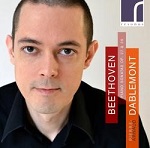
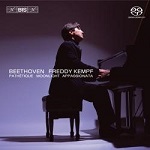 Pierre-Arnaud
Dablemont reminds us that it’s not just the ‘Moonlight’ Sonata that
Beethoven described as quasi una fantasia – the appellation also
belongs to its immediate predecessor, published at the same time. He
gives us both the ‘fantastic’ or meditative qualities of the music but
also its strengths.
Pierre-Arnaud
Dablemont reminds us that it’s not just the ‘Moonlight’ Sonata that
Beethoven described as quasi una fantasia – the appellation also
belongs to its immediate predecessor, published at the same time. He
gives us both the ‘fantastic’ or meditative qualities of the music but
also its strengths.
Competition is stiff enough in No.13 but there’s a packed house for
the ‘Moonlight’, with over 200 recordings in the current catalogue at
all prices – try listening to even all the best of those or picking
just one that stands out above the others. In any case, you probably
have your own favourite(s) already, so I’ll content myself with an acknowledged
performance that, like the new Resonus, also comes in 24-bit sound and
from a young pianist, Freddy Kempf (BIS-SACD-1460, with Pathétique and Appassionata Sonatas – from eclassical.com,
mp3, 16- and 24-bit lossless, with pdf booklet). I also looked back
at my review of Bernard Roberts’ complete set of the Beethoven Sonatas for Nimbus
(NI1774), where I preferred his mature take on the ‘Moonlight’
to HJ Lim’s more youthful and more tentative performance on EMI.
Dablemont offers a sharply-delineated account but he’s slightly faster
even than Lim in the first two movements and I think he misses some
of the magic thereby. Colin Clarke felt that Kempf didn’t transport
him anywhere – review – but, with a timing only seconds faster than Roberts in the opening
movement and much slower than Dablemont or Lim, he succeeds for me better
than either of his two young rivals. All three slightly miss the magic,
so ultimately my preference for Roberts remains unshaken. Kempf is
a shade faster than any of these performers in the second movement and
fastest of all in the finale, where Dablemont is the slowest – taking
almost a minute longer than Kempf, whose more energetic performance
I like best of all in this movement.
With a well-paced account of the Pastoral Sonata to round off
proceedings – slightly slower than Roberts in three of the four movements
– and excellent 24-bit recording, there’s a great deal to be said for
the Dablemont recording of these three sonatas and I look forward to
hearing the planned second volume, but ultimately the challenge from
established accounts of the ‘Moonlight’ is too great – and I haven’t
even mentioned classic recordings by the likes of Wilhelm Kempff and
Artur Schnabel.
Giacomo MEYERBEER (1791-1864)
Ballet music from the operas
Orquestra Simfónica de Barcelona i Nacional Catalunya (Barcelona
Symphony Orchestra)/Michal Nesterowicz
rec. 3-6 July 2012, L’Auditori, Pau Casals Hall, Barcelona, Spain
pdf booklet included
NAXOS 8.573076 [69:40] – from classicsonline.com or eclassical.com (both mp3 and lossless) or stream from Naxos Music Library or Qobuz
(For full details see review by Dan Morgan: ‘One or two dull patches can’t take the shine off this
engaging disc; great fun’ and review by Rob Maynard: ‘Overall … it is difficult to see how a stronger case
might be made for this music’.)
Giacomo MEYERBEER Overtures and Entr’actes from the French
Operas
Robert le Diable (1831) – Overture [3:24]
L’Étoile du Nord (1854) – Overture [9:08]
Les Huguenots (1836) – Overture [4:48]
Les Huguenots – Orgie (Drinking Song, Act 1) [3:36]
Les Huguenots – Entr’acte to Act 2 [2:32]
Les Huguenots – Entr’acte to Act 5 [0:39]
Les Huguenots – Ballet (Act 5) [2:02]
L’Africaine (1865) – Overture [4:33]
L’Africaine – Entr’acte to Act 2 [1:33]
L’Africaine – Entr’acte to Act 3 [3:44]
L’Africaine – Entr’acte to Act 5 [1:24]
L’Africaine – Grand scène du mancenillier (Act 5) [1:41]
Dinorah (Le Pardon de Ploërmel) (1859) – Overture [13:16]
Dinorah – Entr’acte to Act 2 [2:55]
Dinorah – Entr’acte to Act 3 [1:45]
Le Prophète (1849) – Overture [11:06]
Le Prophète – Coronation March (Act 4) [3:17]
New Zealand Symphony Orchestra/Darrell Ang
rec. Michael Fowler Centre, Wellington, New Zealand, from 6th to 8th
June, 2013
pdf booklet included
NAXOS 8.573195 [71:23] – from eclassical.com (mp3, 16- and 24-bit lossless) or classicsonline.com (mp3 and lossless) or stream from Naxos Music Library or Qobuz
(Recording of the Month – see review by Dan Morgan).
Giacomo MEYERBEER Les Patineurs (arr. Constant Lambert
from Le Prophète and L’Étoile du Nord) [20:28]
Jules MASSENET Le Cid – ballet music [17:51]
Felix MENDELSSOHN Lord of Burleigh, Nos. V and VI [4:07]
Franz LISZT Apparitions, Nos. I and VII [7:23]
London Symphony Orchestra/Robert Irving
rec. 1952, 1955. ADD
NAXOS CLASSICAL ARCHIVE 9.80453 [49:49] – from classicsonline.com (mp3) or eclassical.com (mp3 and lossless). Not available in the USA
and several other countries.
Giacomo MEYERBEER Struensee – complete incidental music*
[51:39]
Les Patineurs (arr. Constant Lambert from Le Prophète and L’Étoile du Nord) [18:03]
L’Africaine – Prelude [4:48]
NDR Choir*
Hannover Radio Philharmonic Orchestra/Vladimir Jurowski
rec. 5-12 October 1995, Großer Sendsaal, Hannover. DDD
CPO 999336-2 [74:30] – from eclassical.com (mp3 and lossless, no booklet) or classicsonline.com (mp3, with booklet) or stream from Naxos Music Library (with booklet)

 Naxos
have been doing Meyerbeer proud recently. I have to admit that I have
never been a great fan of his operas – ‘sub-Meyerbeer’ is one of my
favourite terms for music that I don’t like – but I have very much enjoyed
listening to both the recent orchestral releases. Both are available
from eclassical.com in very good lossless sound but at a price higher
than the parent CDs and considerably more than the £4.99 that you’ll
pay for mp3 from classicsonline.com.
Naxos
have been doing Meyerbeer proud recently. I have to admit that I have
never been a great fan of his operas – ‘sub-Meyerbeer’ is one of my
favourite terms for music that I don’t like – but I have very much enjoyed
listening to both the recent orchestral releases. Both are available
from eclassical.com in very good lossless sound but at a price higher
than the parent CDs and considerably more than the £4.99 that you’ll
pay for mp3 from classicsonline.com.
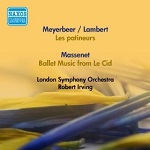 It’s
that old favourite Les Patineurs, however, arranged by Constant
Lambert from some of the music on the Nesterowicz recording, that really
tickled my fancy, an enjoyable confection like Walton’s Bach arrangements, The Wise Virgins. Robert Irving’s recording dates from 1952
but the Naxos transfer has made the most of it, especially in the lossless
version from eclassical.com. The other
It’s
that old favourite Les Patineurs, however, arranged by Constant
Lambert from some of the music on the Nesterowicz recording, that really
tickled my fancy, an enjoyable confection like Walton’s Bach arrangements, The Wise Virgins. Robert Irving’s recording dates from 1952
but the Naxos transfer has made the most of it, especially in the lossless
version from eclassical.com. The other  works
on the album also receive fine performances. Nevertheless, it’s a trifle
dry and shrill and resolutely mono, so you may prefer Richard Bonynge’s
recording but that’s imprisoned in a 10-CD box set (Decca 4685782).
If you are looking for a single-CD recording, Jean Martinon with the
Israel PO may be just the thing: Colin Clarke dubbed it a life-enhancing
disc – review.
(Australian Decca Eloquence 4762742, with Dvořák Slavonic
Dances 1-8 and Massenet Le Cid Ballet Music – stream or download
from Qobuz).
works
on the album also receive fine performances. Nevertheless, it’s a trifle
dry and shrill and resolutely mono, so you may prefer Richard Bonynge’s
recording but that’s imprisoned in a 10-CD box set (Decca 4685782).
If you are looking for a single-CD recording, Jean Martinon with the
Israel PO may be just the thing: Colin Clarke dubbed it a life-enhancing
disc – review.
(Australian Decca Eloquence 4762742, with Dvořák Slavonic
Dances 1-8 and Massenet Le Cid Ballet Music – stream or download
from Qobuz).
The CPO performance may not be in the same league as the versions that
I’ve mentioned, but it comes with the interesting rarity Struensee – the only version of that work – and the recording is good, especially
in the lossless version from eclassical.com.
Hector BERLIOZ (1803-1869)
Harold en Italie , Op.16, H68* [42:24]
Overture: Le Carnaval Romain, Op.9, H95 [8:43]
Rêverie et Caprice , Op.8, H88** [8:44]
Overture: Benvenuto Cellini, Op.23, H76 [10:49]
Lise Berthaud (viola)*; Giovanni Radivo (violin)**
Orchestre National de Lyon/Leonard Slatkin
rec. live Auditorium de Lyon, France, 24 and 26 October, 2013. DDD
pdf booklet included
NAXOS 8.573297 [70:31] – from classicsonline.com (mp3 and lossless) or stream from Naxos Music Library; stream or download
from Qobuz.
(‘Applause would have been well deserved.’ See review by Paul Corfield Godfrey)

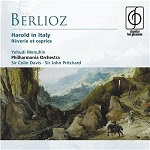 I
got to know Harold in Italy from the William Primrose/Thomas
Beecham recording in its reissued incarnation on Philips Concert Classics
(G03267L), a fine performance but sounding dated even in 1962, and one
which I soon supplemented with Yehudi Menuhin and the young Colin Davis
(HMV ASD537, available till recently on EMI Encore and Classics for
Pleasure – download from sainsburysentertainment.co.uk , excellent value for £3.99) and
was even more won over. Since then I’ve enjoyed hearing Harold as much and as often as the Symphonie Fantastique.
I
got to know Harold in Italy from the William Primrose/Thomas
Beecham recording in its reissued incarnation on Philips Concert Classics
(G03267L), a fine performance but sounding dated even in 1962, and one
which I soon supplemented with Yehudi Menuhin and the young Colin Davis
(HMV ASD537, available till recently on EMI Encore and Classics for
Pleasure – download from sainsburysentertainment.co.uk , excellent value for £3.99) and
was even more won over. Since then I’ve enjoyed hearing Harold as much and as often as the Symphonie Fantastique.
Davis was to go on to re-record the music twice. His second recording,
with Nobuko Imai for Philips remains available, download only, on a
twofer (4422902, with his first LSO version of Symphonie Fantastique). At the time of writing his LSO Live recording of this work, with
Tabea Zimmerman, LSO0040, was not available in lossless sound
from Hyperion, though it can be obtained in mp3 from classicsonline.com,
albeit that the price of £7.99 is more than the £6 or less for which
you should be able to find the CD on sale. At £25.99 from COL the 12-CD
bicentennial set including Les Troyens,La Damnation de Faust, Béatrice et Benedict, Roméo et Juliette, Symphonie
Fantastique and Harold is much better value ( LSO0046: Bargain of the Month – 2013/7).
John Whitmore thought the Orchestre de Lyon and Felix Slatkin absolute
winners in an earlier Berlioz release of Symphonie Fantastique (8.572886: Recording of the Month – review)
and, though I was rather less enthusiastic by comparison with Beecham
(EMI) and Ticciati (Linn), I also enjoyed hearing it – 2012/20.
Though I requested the Naxos Harold as a lossless download from
classicsonline.com, I received only the mp3, so I listened to the Qobuz
lossless streamed versions of both it and the LSO Live for comparison.
I also took the opportunity to reacquaint myself from the same source
with the Menuhin/Davis recording where the opening brooding melancholy
is captured better than on the new Naxos, though the first movement
as a whole ultimately lacks a little energy. By the time of his LSO
Live version, Davis’s tempo for the first movement overall had speeded
up considerably – 14:14 against 16:25. Now the scènes de mélancolie move a little too fast for my liking, which means that I might be expected
to prefer the compromise time of 15:10 on Naxos, except that’s what
it sounds like at first, a compromise, taking a little too long to get
under way.
Paul Corfield Godfrey wondered if the Naxos brigands were quite menacing
enough and I’m inclined to agree; though it’s not a capital offence,
it’s significant that Slatkin is slowest overall in this fourth movement,
with the latest Davis a tad faster and wilder than his earlier self.
Honours are about even in the remaining movements. For all that Menuhin
is open to the criticism of making the work sound too much like a concerto,
it’s that EMI version that I ultimately find the most satisfying by
a small margin. If you’re happy with mp3 (at the top bit-rate) Sainsbury’s
price is very attractive, but the other two recordings also come at
tempting prices.
The 1960s recording still sounds surprisingly well – in some respects
it’s more open than the new Naxos, though I don’t want to make too much
of that. The LSO Live recording sounds fine, too, with little allowance
needing to be made for the Barbican acoustic.
Those in search of Harold in Italy on period instruments should
consult John Quinn’s review of the Mark Minkowski recording, with Nuits d’Été on Naïve V5266. Download from classicsonline.com or stream from Naxos
Music Library or Qobuz.
Felix MENDELSSOHN (1809–1847) Mendelssohn in Birmingham, Volume 2
Overture to ‘Ruy Blas’, Op.95 [7:20]
Symphony No.1 in c minor, Op.11 (1827) [29:56]
Symphony No.3 in a minor, Op.56 ‘Scottish’ (1842) [37:11]
City of Birmingham Symphony Orchestra/Edward Gardner
rec. Town Hall, Birmingham; 25 and 26 October 2013 (Symphonies); 16
February 2014 (Overture). DDD/DSD
pdf booklet available
CHANDOS CHAN5139 [74:50] – from theclassicalshop.net (mp3, 16- and 24-bit lossless)
Also available as CHSA5139, hybrid SACD
 Volume
1 of this series (CHAN/CHSA5132) brought us the Hebrides Overture and Symphonies 4 and 5, so there’s only the neglected No.2
to come. After a slightly hesitant Hebrides, I enjoyed the two
symphonies on the earlier release –2014/2 – and the second volume brings a repeat in that Ruy Blas seemed
slightly less than coherent at times. As before, too, the album pairs
a well-known work, the Scottish Symphony, with a less well-known
predecessor. There’s not a great deal to do with the First Symphony,
even for Claudio Abbado on my benchmark set of the Mendelssohn symphonies
(DG – see 2014/2)
other than to play it comparatively straight and that’s what Gardner
does, though he’s consistently a little faster in each movement than
Abbado and, in the first two movements, than Andrew Litton (BIS). I
think the advantage lies with Abbado here, though it’s not that Gardner
ever makes the music perfunctory – rather that it comes over as sounding
more like the work of a mature composer from Abbado.
Volume
1 of this series (CHAN/CHSA5132) brought us the Hebrides Overture and Symphonies 4 and 5, so there’s only the neglected No.2
to come. After a slightly hesitant Hebrides, I enjoyed the two
symphonies on the earlier release –2014/2 – and the second volume brings a repeat in that Ruy Blas seemed
slightly less than coherent at times. As before, too, the album pairs
a well-known work, the Scottish Symphony, with a less well-known
predecessor. There’s not a great deal to do with the First Symphony,
even for Claudio Abbado on my benchmark set of the Mendelssohn symphonies
(DG – see 2014/2)
other than to play it comparatively straight and that’s what Gardner
does, though he’s consistently a little faster in each movement than
Abbado and, in the first two movements, than Andrew Litton (BIS). I
think the advantage lies with Abbado here, though it’s not that Gardner
ever makes the music perfunctory – rather that it comes over as sounding
more like the work of a mature composer from Abbado.
I surveyed some of the vast range of rival recordings of the Scottish Symphony in 2014/2:
Peter Maag’s classic Decca, which held the field until replaced, also
on Decca, by Claudio Abbado, who went on to record the work for DG,
a surprisingly nifty version from Otto Klemperer and Herbert von Karajan’s
coupling of Nos. 3 and 4 on DG Originals all have strong points.
There’s no ‘best buy’ among these but Gardner is up there with the best
and Chandos have only one rival in 24-bit sound or SACD, from Andrew
Litton (Nos. 3 and 5: BIS: Recording of the Month – review).
Two of my colleagues remarked on the sense of movement which Gardner
obtained on the earlier release, especially in the Italian Symphony
–review and review – so I was looking to find the same in the Scottish, which I happen
to think the better of the two best-known of his symphonies. Sure enough,
he’s a trifle faster than Litton in movements 1, 3 and 4, with almost
exact agreement on the tempo for the second movement, very well handled
by both. Fast shouldn’t mean hectic in the first movement and there’s
no sense that Gardner is driving the horses too hard on this tour of
the Scottish countryside; the introduction captures the brooding Holyrood
theme which Mendelssohn composed many years before completing the symphony
and the Scottish weather is typically uncertain throughout.
For me the test of any performance of this symphony concerns the transition
in the final movement at the point where it seems that Mendelssohn has
said all there is to say before surprising us by launching into new
material with the coda. The transition should be apparent without seeming
like a join – conductor and orchestra have to do some nifty double de-clutching
for this gear change. If anything, the change is just a little too
slick here, but that’s infinitely better than making it sound jerky
and the ending is as stately as it is even from Maag and Abbado – or,
at a slightly slower pace overall, from Litton.
The recording is very good, with little to choose between the 24-bit
BIS and Chandos recordings – both a little more expensive than mp3 or
16-bit but worth the extra. For those with the right equipment Chandos
even have a 24-bit surround version at a rather hefty premium price.
Slightly confusingly, Chandos have chosen the self-same Mendelssohn
drawing for the cover as for Volume 1, though it’s slightly less cropped
than before. It was a nice touch to use it for Volume 1 but a bit hackneyed
to use it again and a potential cause of confusion.
Jacques OFFENBACH (1819-1880) Overtures
La Vie Parisienne Overture [5:03]
Orphée aux Enfers Overture [10:09]
Monsieur et Madame Denis Overture [6:42]
La Belle Hélène Overture [9:40]
La Grande-Duchesse de Gérolstein Overture [4:35]
Barbe-bleue Overture [6:25]
Wiener Staatsoper/Hermann Scherchen
rec. 1961.
ARCHIPHON ARC-WU178 [42:34] – from eclassical.com (mp3, 16- and 24-bit lossless) or stream from Qobuz
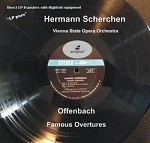 The
best recordings of Offenbach are vintage: Solti’s Gaîté Parisienne (Australian Decca Eloquence 4762724 – review and review – with Gounod and Respighi ballet music) and five overtures from Jean
Martinon (Australian Decca Eloquence 4762757, with Adam, Boiëldieu
and Zampa), so I was anticipating enjoying this series of recordings
made for Westminster with the Vienna State Opera Orchestra by Hermann
Scherchen, especially as I missed it first time around. The performances
are bright and lively if a little lacking in finesse – the workday VSOO
never had the cachet of the Sunday-best Vienna Phil.
The
best recordings of Offenbach are vintage: Solti’s Gaîté Parisienne (Australian Decca Eloquence 4762724 – review and review – with Gounod and Respighi ballet music) and five overtures from Jean
Martinon (Australian Decca Eloquence 4762757, with Adam, Boiëldieu
and Zampa), so I was anticipating enjoying this series of recordings
made for Westminster with the Vienna State Opera Orchestra by Hermann
Scherchen, especially as I missed it first time around. The performances
are bright and lively if a little lacking in finesse – the workday VSOO
never had the cachet of the Sunday-best Vienna Phil.
Archiphon have made some fine transfers from recordings of this vintage
and even earlier. This transfer, heard in 24-bit format, is bright
and fresh, as befits the music, but too dry to be mistaken for anything
more recent. The two Eloquence CDs that I’ve mentioned are a shade
over-bright, too, but Decca, of course, were able to use the original
master tapes whereas Archiphon are dependent on LP copies. All in all,
I’d go for the Martinon, either on the Eloquence CD or via the Decca
Original Masters set of his recordings (4757209 – download only
or stream from Qobuz).
Anton BRUCKNER (1824-1896)
Symphony No.9 in d minor (Edition: Leopold Nowak)
Lucerne Festival Orchestra/Claudio Abbado
rec. live Concert Hall, Lucerne, KKL, 21-26 August, 2012. DDD.
DEUTSCHE GRAMMOPHON 4793441 [63:07] Stream or purchase for download
from Qobuz.
(Recording of the Month – see review by John Quinn)
 I
was hoping to get to this recording ahead of the field but John Quinn
has already beaten me to the draw – and by the time that I got this
edition of DL News together, it had been made Recording of the Month
elsewhere, too.
I
was hoping to get to this recording ahead of the field but John Quinn
has already beaten me to the draw – and by the time that I got this
edition of DL News together, it had been made Recording of the Month
elsewhere, too.
There’s a kind of divinity that shapes our ends in the fact that Claudio
Abbado’s first foray into Bruckner was a recording for Decca in the
early 1970s of the First Symphony (SXL6494) and his last recording was
this of the Ninth at the Lucerne Festival over forty years later. That
first recording has recently been reissued by Australian Decca on the
budget Eloquence label, coupled with a crisp performance of Beethoven’s
Symphony No.8, not the most obvious of couplings, but I was pleased
to hear this performance of one of my favourite Beethoven symphonies
again in CD quality sound from Qobuz.
There was a feeling in 1971 that Abbado hadn’t yet settled into the
role of Bruckner conductor, but I think the problem, at least in part,
was that Bruckner, despite two unpublished attempts, now labelled ‘0’
and ‘00’, had not yet settled into the role of composer.
Like Eugen Jochum before him, whose DG recordings of Bruckner with the
BPO and Bavarian RSO remain available in a DG budget-price box (E4698102),
Abbado tended to present Bruckner’s First Symphony in distinct blocks,
separated from each other by marked tempo changes. It may be because
Jochum was one of the first conductors from whom I got to know Bruckner
– his recording of the Ninth was one of the few genuine stereo LPs on
the budget Heliodor label (89551) – that I like that approach, though
overall it’s Günter Wand’s Bruckner, with fewer and smoother transitions,
that is more satisfying. On this occasion, however, I’m going to set
aside memories of recordings of the Ninth by Jochum, Wand and Klemperer
– whose indifferently recorded Vox LP of the Romantic Symphony
introduced me to that work – and, like John Quinn, concentrate on the
Abbado version alone.
I will, however, make a brief detour to remind readers of the ‘completed’
Ninth which Simon Rattle recorded a couple of years ago and which I
and many found convincing, though others didn’t. (Warner/EMI 9529692: Recording of the Month – review; review and Download of the Month DL
Roundup June 2012/2). Also I note that Günter Wand’s recordings
for RCA are available as downloads at give-away prices, with his Berlin
Philharmonic Ninth available from 7digital.com for an incredible £2.97.
That said, after reading John Quinn’s review I scrapped my notes because
he has said it all, leaving me needing only to say that the streamed
version from Qobuz to which I listened in CD-quality sound is excellent
and costs little more in that quality, depending on the exchange rate,
than I have been able to find available in mp3.
Pyotr Ilyich TCHAIKOVSKY (1840-1893) Piano Concerto No.1 in
b-flat minor, Op.23 [32:52]
Frédéric CHOPIN (1810-1849) Piano Concerto No.1 in e minor, Op.11
[39:41]
Ingolf Wunder (piano)
St Petersburg Philharmonic Orchestra/Vladimir Ashkenazy
rec. live, St Petersburg Philharmonia, Grand Hall, June 2012. DDD
DEUTSCHE GRAMMOPHON 4790670 [72:33] – from 7digital.com (mp3) or stream from Qobuz (with booklet)
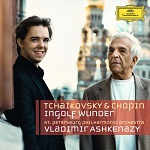 Did
we really need another recording of these two warhorse concertos, even
one as special as this live recording from St Petersburg White Nights
in June 2012, with former Tchaikovsky Piano Competition winner Vladimir
Ashkenazy at the helm rather than the piano, directing the latest young
phenomenon? I almost called him the latest Wunderkind, but managed
to refrain from such an awful pun.
Did
we really need another recording of these two warhorse concertos, even
one as special as this live recording from St Petersburg White Nights
in June 2012, with former Tchaikovsky Piano Competition winner Vladimir
Ashkenazy at the helm rather than the piano, directing the latest young
phenomenon? I almost called him the latest Wunderkind, but managed
to refrain from such an awful pun.
Of the many first-rate recordings of the Tchaikovsky, my benchmark is
that made by Stephen Hough with the Minnesota Orchestra and Osmo Vänskä
(Hyperion CDA67711/2, 2 CDs: Piano Concertos Nos. 1 and 2 plus
the Concert Fantasia and the single-movement Piano Concerto No.3).
Ian Lace declared this set a triumph and made it a Recording of
the Month – review – thereby sparing me from writing a lengthy review in the September
2010 Download Roundup, since I could only agree with him entirely.
I also listened to Lang Lang’s recording with Daniel Barenboim and the
Chicago Symphony Orchestra (also DG 4742912, with Mendelssohn
Piano Concerto No.1), another recording made by a then up-and-coming
pianist with a former pianist at the helm. I heard Lang Lang perform
the concerto at the proms in July 2003, a performance which I recall
as having been virtuoso but wayward, delighting the audience though
one wondered afterwards if it had really got to the heart of the music.
I see that our MusicWeb International Seen and Heard reviewer, Alex
Russell, was as impressed as I had been at first and that the then editor,
Marc Bridle, shared my subsequent misgivings – review.
Surprisingly Lang Lang achieves his effect on record with much broader
tempi than either Hough or Wunder, perhaps under the influence of Barenboim,
whose own recording with Celibidache and the Munich Philharmonic (EMI,
download only, or Euroarts DVD) was also notable for broad tempi. By
the same token, the tempi on the new recording may owe as much to Ashkenazy,
whose own 1963 recording with the LSO and Lorin Maazel (Decca Legends 4586282, with Schumann, or less expensively Decca Virtuoso 4783367,
with Symphony No.4) also favoured tempi more in line with the norm for
this concerto.
Ingolf Wunder has already given us a Chopin recording (4779634:
Piano Sonata No.3, Andante Maestoso, etc) which Robert Beattie
hailed as indicative of a great future, provided that he chose his repertoire
carefully – review.
These performances will not hamper his upward rise and I’m sure that
the new CD will sell well. No doubt it went down a storm on the night
but on record it merely preserves two good but not very special performances
with no particular insights. I liked the Chopin better than the Tchaikovsky,
but stay with Hough and Vänskä for Tchaikovsky and Rubinstein for the
Chopin or Ingrid Fliter for a more recent recording of both his concertos.
Nikolai RIMSKY-KORSAKOV (1844-1908)
Scheherazade, Op.35 [46:58] (with improvisations for Oudh [0:47]
and Qanun [0:17])
Mikhail IPPOLITOV-IVANOV (1859-1935) Caucasian Sketches,
Op.10/2 (1894) [6:22] and 4 [3:57]
Mily BALAKIREV (1837-1910) Islamey: Oriental Fantasy,
Op.18 (arr. Lyapunov) [9:01]
Ulvi Cemal ERKIN (1906-1972) Köçekçe: Dance Rhapsody for
Orchestra (1943) [9:47]
Borusan Istanbul Philharmonic Orchestra/Sascha Goetzel
rec. Istinye, Istanbul, 11–15 February 2014. DDD
pdf booklet included
ONYX ONYX4124 [77:13] from classicsonline.com or stream from Naxos
Music Library or from Qobuz (with alternative version of The Story of the Kalendar Prince [6:20] and alternative version of Caucasian Sketches, No.2 [6:20])
(‘[The] changes, while certainly novel and interesting in themselves,
will for others be insufficiently radical in practice either to justify
the claims made for them or to render the revised versions of much real
interest.’ See review by Rob Maynard.)
Scheherazade , Op.35 [45:20]
Toronto Symphony Orchestra/Peter Oundjian
rec. live Roy Thomson Hall, Toronto, June 2013. DDD/DSD
pdf booklet available
CHAN5145 [45:20] – from theclassicalshop.net (mp3, 16/44.1, 24/192 and surround sound) or stream from Naxos
Music Library
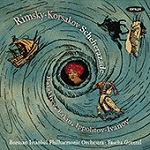 One
penny-plain and one tuppeny-coloured recording of Scheherazade.
The Onyx comes with two short interpolations for the Oudh and Qanun
respectively: the latter instrument is used to accompany the violin
in the Princess’s solo passages instead of the harp and other Turkish
and Arabic instruments are interspersed with a conventional Western
orchestra throughout. There’s nothing to scare traditionalists – see
Rob Maynard’s comments above –but a touch of eastern colour certainly
adds to the appeal not just of the main work but also of the attractive
couplings, especially the Caucasian Sketches. It doesn’t quite
supplant the favourites that I mention at the end of the review but
it complements them very well, especially if you want the Erkin Dance
Suite, of which this is the only recording.
One
penny-plain and one tuppeny-coloured recording of Scheherazade.
The Onyx comes with two short interpolations for the Oudh and Qanun
respectively: the latter instrument is used to accompany the violin
in the Princess’s solo passages instead of the harp and other Turkish
and Arabic instruments are interspersed with a conventional Western
orchestra throughout. There’s nothing to scare traditionalists – see
Rob Maynard’s comments above –but a touch of eastern colour certainly
adds to the appeal not just of the main work but also of the attractive
couplings, especially the Caucasian Sketches. It doesn’t quite
supplant the favourites that I mention at the end of the review but
it complements them very well, especially if you want the Erkin Dance
Suite, of which this is the only recording.
There are three requirements for any recording of Scheherazade to work: power in the exciting passages, seductive sound in the quieter
sections and the best recording for the time. An alluring cover picture
helps, too. The Onyx, to which I listened in CD-quality sound from
Qobuz – a playlist, so not for purchase – meets my performance requirements
and it certainly sounds very good, but the only download at the moment
is in mp3 only, so audiophiles may wish either to wait to see if eclassical.com
bring out a lossless version or to purchase the CD.
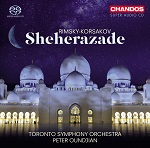 The
Chandos recording certainly meets the recording requirements, with SACD
and 24/192 and surround-sound downloads in addition to mp3 and 16-bit
lossless. I was disappointed not to see a 24/96 version: 24/192 takes
a long time to download and many DACs, including my own Dragonfly, can’t
cope with higher than 24/96, so I went for the 16-bit version. At least
that levels the playing field with the Onyx and if the latter has a
good deal more bite, I think that’s as much down to the orchestra as
to the engineers.
The
Chandos recording certainly meets the recording requirements, with SACD
and 24/192 and surround-sound downloads in addition to mp3 and 16-bit
lossless. I was disappointed not to see a 24/96 version: 24/192 takes
a long time to download and many DACs, including my own Dragonfly, can’t
cope with higher than 24/96, so I went for the 16-bit version. At least
that levels the playing field with the Onyx and if the latter has a
good deal more bite, I think that’s as much down to the orchestra as
to the engineers.
Heard on its own the Chandos performance sounded very enjoyable, and
no doubt it was a success on the night in Toronto – I understand that
there was prolonged and noisy applause – but it comes across as a little
dull when heard again after the Onyx or the benchmark recordings which
I’ve listed at the end of this review. Add the not inconsiderable disadvantage
that it offers short value for a full-price recording – the downloads
are reduced by a few pence each, no doubt to cover that, but not by
enough to make a difference – and its main appeal would seem to be to
those who want a souvenir of an enjoyable evening out.
Back in 1948 Ernest Ansermet with the Paris Conservatoire Orchestra
pressed the right buttons in terms of recording quality for the editor
of Gramophone, trying out his new Electrogram De Luxe 3000. Reissued
on LP in 1950 before being superseded by his 1954 remake, also with
the PCO (Australian Decca Eloquence), that recording has been preserved
in tidied-up sound by Naxos Classical Archives – yours for just £1.99
from classicsonline.com unless you live in the USA or one of the other countries where this
label is verboten. It wouldn’t pass muster now in terms of recording
quality, even heard in CD quality from Qobuz,
with a rather crumbly opening, nor does the cover meet my extra requirement,
but Ansermet had a way with Rimsky and he generates from the word go
the same sort of excitement that you find on the Onyx recording and
which isn’t quite there on Chandos.
Beecham’s Scheherazade at mid price remains my benchmark (Warner/EMI 5669832 – review)
alongside Reiner (RCA) and Schwarz on Naxos is excellent value – DL
Roundup March 2011 – but the new Onyx recording is so special that
it can be regarded as a supplement to any one of these.
Ernö (Ernst von) DOHNÁNYI (1877-1960) Chamber Music
Piano Quintet No. 2 in e flat minor, Op. 26 (1914) [23:50]
Sextet in C, Op. 37 for piano, violin, viola, cello, clarinet and horn
(1935) [30:19]
Ernö Szegedi (piano), Béla Kovács (clarinet), Ferenc Tarjáni (horn)
Tátrai Quartet
rec. 1977 (?) ADD
HUNGAROTON HCD11624 [54:09] – from eclassical.com (mp3 and lossless) or stream from Naxos
Music Library
 This
Hungaroton recording is not available in the UK on CD and there’s no
booklet with the download. As it was first released on LP in 1978,
I’m assuming that it was recorded the previous year, the Dohnányi centenary.
It’s certainly older than the release date which eclassical.com give,
July 2014 – that’s when they added a very substantial and welcome chunk
of the Hungaroton catalogue to their site. These performances of mainly
mellow neo-Brahmsian music are clearly authoritative; more to the point,
they are most enjoyable and the recording wears its age well, especially
in lossless form.
This
Hungaroton recording is not available in the UK on CD and there’s no
booklet with the download. As it was first released on LP in 1978,
I’m assuming that it was recorded the previous year, the Dohnányi centenary.
It’s certainly older than the release date which eclassical.com give,
July 2014 – that’s when they added a very substantial and welcome chunk
of the Hungaroton catalogue to their site. These performances of mainly
mellow neo-Brahmsian music are clearly authoritative; more to the point,
they are most enjoyable and the recording wears its age well, especially
in lossless form.
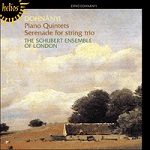 A
rival recording on Hyperion offers the two Piano Quintets and the Serenade
for String Trio at budget price and comes with a pdf booklet (CDH55412 [75:43] – from hyperion-records.co.uk,
mp3 and lossless, rec. 1995, DDD). If the Hungaroton performers set
the benchmark, The Schubert Ensemble of London on this reissue are not
far behind; they offer more music, well recorded, at a lower price and
Hyperion include a valuable book of words.
A
rival recording on Hyperion offers the two Piano Quintets and the Serenade
for String Trio at budget price and comes with a pdf booklet (CDH55412 [75:43] – from hyperion-records.co.uk,
mp3 and lossless, rec. 1995, DDD). If the Hungaroton performers set
the benchmark, The Schubert Ensemble of London on this reissue are not
far behind; they offer more music, well recorded, at a lower price and
Hyperion include a valuable book of words.

 For
Dohnányi’s two piano concertos, too, there’s a choice which may safely
be decided on the basis of price and personal preference: Howard Shelley
with Mathias Bamert and the BBC Philharmonic, recorded in 2001 and 2004,
are on lower mid-price Chandos CHAN10599 – review – download from theclassicalshop.net (mp3 and lossless; pdf booklet available) or stream from Qobuz.
The slightly earlier Hyperion recording remains at full price: Martin
Roscoe with the BBC Scottish SO and Fedor Glushchenko (CDA66684 – from hyperion-records.co.uk,
mp3 and lossless, with pdf booklet) but, as lossless comes at the same
price as mp3 from Hyperion – both £7.99 – that means that the two downloads
are offered at the same price. (The mp3 version of the Chandos costs
£4.99).
For
Dohnányi’s two piano concertos, too, there’s a choice which may safely
be decided on the basis of price and personal preference: Howard Shelley
with Mathias Bamert and the BBC Philharmonic, recorded in 2001 and 2004,
are on lower mid-price Chandos CHAN10599 – review – download from theclassicalshop.net (mp3 and lossless; pdf booklet available) or stream from Qobuz.
The slightly earlier Hyperion recording remains at full price: Martin
Roscoe with the BBC Scottish SO and Fedor Glushchenko (CDA66684 – from hyperion-records.co.uk,
mp3 and lossless, with pdf booklet) but, as lossless comes at the same
price as mp3 from Hyperion – both £7.99 – that means that the two downloads
are offered at the same price. (The mp3 version of the Chandos costs
£4.99).
For a choice of recordings of the perennial Dohnányi favourite, Variations
on a Nursery Theme, please see June
2010 DL Roundup.
John IRELAND (1879-1962) Earth’s Call: Songs for Soprano and Piano
(including Earth’s Call; I have twelve Oxen; Love is a sickness full
of woes; Mother and Child; Tryst; The Trellis; Three Songs; Three Thomas
Hardy Songs; Songs Sacred and Profane; The sacred Flame; The three Ravens; Tutto e sciolto; Variations sur ‘Cadet Rousselle’; When
I am dead, my Dearest)
April Fredrick (soprano)
Mark Bebbington (piano)
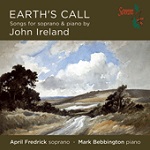 rec.
Symphony Hall, Birmingham, 28-29 August 2012. DDD
rec.
Symphony Hall, Birmingham, 28-29 August 2012. DDD
pdf booklet with texts included
SOMM SOMMCD0137 [74:26] – from classicsonline.com (mp3) or stream from Naxos Music Library or Qobuz
(‘An enjoyable collection that will be welcomed by all admirers of John
Ireland.’ See review and full track listing from Ian Lace.)
Somm have given us several fine recordings of the music of John Ireland,
including one of his part songs, coupled with Delius’ part songs performed
by the Birmingham Conservatoire Chamber Choir/Paul Spicer (SOMMCD0119 – from theclassicalshop.net, mp3 and lossless, no booklet, or classicsonline.com,
mp3, or stream from Naxos Music Library, both with pdf booklet). This
new album is a worthy successor.
Ernest BLOCH (1880–1959)
Macbeth – Two Interludes (Act I and Act III) [13:37]
Symphony in E flat [25:09]
In Memoriam [4:28]
Three Jewish Poems [24:41]
Royal Philharmonic Orchestra/Dalia Atlas
rec. St Barnabas Church, Mitcham, Surrey, UK, 14-15 October, 1996. DD
pdf booklet included
(originally released on ASV CDDCA1019)
NAXOS 8.573290 [68:02] – from classicsonline.com (mp3 and lossless) or stream from Naxos
Music Library or Qobuz.
 I
haven’t been keeping up with Naxos’s series of recordings of the music
of Ernest Bloch – actually reissues from ASV, when the conductor was
known as Dalia Atlas Sternberg – but this latest release shows what
I have been missing, though the music is amongst Bloch’s least known
output.
I
haven’t been keeping up with Naxos’s series of recordings of the music
of Ernest Bloch – actually reissues from ASV, when the conductor was
known as Dalia Atlas Sternberg – but this latest release shows what
I have been missing, though the music is amongst Bloch’s least known
output.
As Paul Corfield Godfrey writes ‘This was always a superb release, and
one is grateful to Naxos for reissuing it’ and I can’t do better than
to refer you to his review.
I’ll just add that the lossless version streamed from Qobuz sounds
excellent but you need to download from classicsonline.com or stream
from Naxos Music Library for the booklet – Qobuz promise it but don’t
deliver.
If your knowledge of Bloch’s music begins and ends with Schelomo,
this is the place to add to it.
Walter BRAUNFELS (1882-1954)
Piano Concerto, Op.21 (1910-11)* [32:02]
Ariels Gesang, Op.18 (1910) (after Shakespeare’s ‘The Tempest’)
[10:08]
Schottische Phantasie for Viola and Orchestra, Op.47 (1932-33)**
[33:20]
Victor Sangiorgio (piano)*
Sarah-Jane Bradley (viola)**
BBC Concert Orchestra/Johannes Wildner
*/** World premiere recordings
rec. Watford Colosseum, 15-17 April 2013. DDD.
DUTTON EPOCH CDLX7304 [75:32] – from emusic.com (mp3). Stream samples (only) from Qobuz.
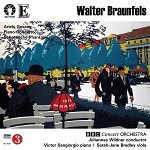 There’s
more music by Braunfels in the catalogue than I had realised, but full
marks yet again to Dutton for premiere recordings of the two works for
soloist and orchestra. The music is attractive, encouraging me to try
more of Braunfels’ work, and the performances make a strong case for
it.
There’s
more music by Braunfels in the catalogue than I had realised, but full
marks yet again to Dutton for premiere recordings of the two works for
soloist and orchestra. The music is attractive, encouraging me to try
more of Braunfels’ work, and the performances make a strong case for
it.
The emusic.com download costs £2.10 but non-subscribers can download
from amazon.co.uk or iTunes for £7.99. The emusic.com version comes at around 240kb/s – not far
short of what you are likely to get for more money from Amazon and iTunes.
With decent bit-rates on the emusic version of the Steiner Gone with
the Wind (below) too, things seem to be looking up in that direction.
More to the point, it more than adequately conveys the quality of some
fine recordings. Only the slow movement of the Piano Concerto is available
complete from Qobuz but I listened to that in lossless sound, superior
to emusic.com’s mp3 but not so much as to put it to shame. 1-minute
samples of the other movements on Qobuz will give you some idea of the
quality of the music, performances and recording.
A 2-piano reduction of the score of the Piano Concerto is available
online at imslp.
 Freebie of the Month
Freebie of the Month
Arnold BAX (1883-1953) Orchestral Works Volume 7
Winter Legends [43:27]
Symphonic Variations: Parts 1 and 2 [49:51]
Margaret Fingerhut (piano)
London Philharmonic Orchestra/Bryden Thomson
rec. April 1986 and January 1987. DDD
pdf booklet available
CHANDOS CHAN10209 [91:06] – from theclassicalshop.net (mp3 and lossless)
 Chandos
have done very well by Bax, with seats at all prices from the lower-mid-price
Bryden Thomson reissues through to more recent full-price offerings,
some in 24-bit sound like the new album (below). Coincidentally, my Freebie of the Month, offered in mp3 to subscribers to
their free online magazine, is Volume 7 of the Bryden Thomson series.
I’ve already recommended this performance of Winter Legends in
an alternative coupling, with Saga Fragment, on CHAN8484,
but that’s still at full price and rather short value at 54 minutes
overall. As Saga Fragment is available at the same lower price
on Volume 6 of the series, CHAN10159 [77:15], with Russian
Suite, Four Songs, Golden Eagle and Romantic Overture,
the two less expensive offerings would seem to be the better option.
Chandos
have done very well by Bax, with seats at all prices from the lower-mid-price
Bryden Thomson reissues through to more recent full-price offerings,
some in 24-bit sound like the new album (below). Coincidentally, my Freebie of the Month, offered in mp3 to subscribers to
their free online magazine, is Volume 7 of the Bryden Thomson series.
I’ve already recommended this performance of Winter Legends in
an alternative coupling, with Saga Fragment, on CHAN8484,
but that’s still at full price and rather short value at 54 minutes
overall. As Saga Fragment is available at the same lower price
on Volume 6 of the series, CHAN10159 [77:15], with Russian
Suite, Four Songs, Golden Eagle and Romantic Overture,
the two less expensive offerings would seem to be the better option.
The download comes at the same price as a single disc: £4.99 (mp3) or
£7.99 (lossless). Illogically, however, the 2-CD set costs less than
that: only £7 direct from Chandos. Beware of other providers who charge
more than twice that amount for mp3 only.
Chandos’ latest full-price Bax offering is:
Four Orchestral Pieces (1912-13: premiere recording) [26:54]
Phantasy for Viola and Orchestra in d minor (1920, dedicated to Lionel
Tertis)* [21:52]
Overture, Elegy, and Rondo (1927) [24:12]
Philip Dukes (viola)*
BBC Philharmonic/Sir Andrew Davis
rec. MediaCity UK, Salford, 20 and 21 May 2014. DDD.
pdf booklet available
CHANDOS CHAN10829 [73:23] – from theclassicalshop.net (mp3, 16- and 24-bit lossless) or stream from Naxos Music Library
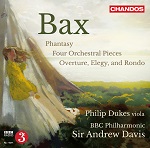 The Four Orchestral Pieces here receive their first recording but
the Phantasy for Viola and Orchestra is not exactly familiar
territory either, with only two other recordings to its name, from Roger
Chase and the BBCCO/Stephen Bell on Dutton (CDLX7295 - review)
and in an arrangement for viola and harp from Doris Lederer and Jude
Mollenhauer on Centaur (CRC2570). There’s only one other recording
of the Overture, Elegy and Rondo, dedicated to Eugene Goossens
– available on its initial release on Marco Polo or as reissued less
expensively by Naxos (8.555109, with Sinfonietta – Slovak
PO/Barry Wordsworth – review).
The Four Orchestral Pieces here receive their first recording but
the Phantasy for Viola and Orchestra is not exactly familiar
territory either, with only two other recordings to its name, from Roger
Chase and the BBCCO/Stephen Bell on Dutton (CDLX7295 - review)
and in an arrangement for viola and harp from Doris Lederer and Jude
Mollenhauer on Centaur (CRC2570). There’s only one other recording
of the Overture, Elegy and Rondo, dedicated to Eugene Goossens
– available on its initial release on Marco Polo or as reissued less
expensively by Naxos (8.555109, with Sinfonietta – Slovak
PO/Barry Wordsworth – review).
The 24-bit recording comes at a premium price of £13.99 (with mp3 for
£7.99 and 16-bit lossless for £9.99) but it captures the music extremely
well.
York BOWEN (1884-1961)
String Quartet No. 2 in d minor, Op.41 (c.1918) [28:42]
String Quartet No. 3 in G, Op.46 (b) (1919) [27:21]
Phantasy-Quintet for Bass Clarinet and String Quartet, Op.93 (1932)*
[14:21]
Timothy Lines (bass clarinet)*
Archaeus Quartet (Ann Hooley, Bridget Davey (violin); Elizabeth Turnbull
(viola); Martin Thomas (cello)
rec. Recital Room, Tonbridge School, Kent, UK, 16-20 December, 2001.
DDD
World première recordings
NAXOS 8.571366 [70:22] – from classicsonline.com (mp3) or stream from Naxos
Music Library or Qobuz.
Previously released on BMS426CD – review – review
 With
so much being done to advance the once almost forgotten cause of York
Bowen, notably by Hyperion and Chandos, how odd, I thought, of Naxos
exactly to duplicate the pioneering recordings of this music on the
BMS label – even using the same cover picture. Look again and it is that same recording, now taken under the Naxos wing. I reviewed the
download of the BMS recording as recently as 2014/7 and it remains available
for £2.94 but I’d recommend paying a little extra now for the classicsonline.com
download at a better bit-rate and complete with the booklet of notes,
not available from emusic.com.
With
so much being done to advance the once almost forgotten cause of York
Bowen, notably by Hyperion and Chandos, how odd, I thought, of Naxos
exactly to duplicate the pioneering recordings of this music on the
BMS label – even using the same cover picture. Look again and it is that same recording, now taken under the Naxos wing. I reviewed the
download of the BMS recording as recently as 2014/7 and it remains available
for £2.94 but I’d recommend paying a little extra now for the classicsonline.com
download at a better bit-rate and complete with the booklet of notes,
not available from emusic.com.
Lovers of English music who haven’t yet bought the BMS version should
go for it in one form or the other. At least try one of the streamed
versions if you can – preferably the Qobuz which is available in lossless
quality.
Max STEINER (1888-1971) Gone with the Wind
Gone with the Wind - Tara - Invitation to the Dance - Melanie’s Theme
- Ashley - The Prayer - Bonnie Blue Flag - Scarlet O’Hara [15:07]
Scarlett’s Agony - War - Return to Tara - Bonnie’s Death - Rhett Butler
- Bonnie’s Theme - Ashley and Melanie (Love Theme) - The Oath [14:58]
Max Steiner Orchestra/Max Steiner
rec. 1954. ADD
NAXOS CLASSICAL ARCHIVES 9.81200 [30:05] – from emusic.com or classicsonline.com (both mp3) or stream from Naxos Music Library
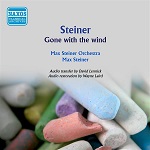 The
original sound track, conducted by Max Steiner himself, is available
at mid-price from Sony – stream from Qobuz.
Film recording was well ahead of the 78rpm technology of the day (1939)
and the sound is still more than tolerable. Attempts to produce commercial
recordings of the music at the time were apparently thwarted – MGM thought
that there was no market for them, but various cover versions of this
music appeared in the 1950s and 1960s, from the likes of Percy Faith,
Cyril Ornadel and Dave Brubeck. This download dates from 1954 – authoritative
performances in decent, if rather thin, mono sound.
The
original sound track, conducted by Max Steiner himself, is available
at mid-price from Sony – stream from Qobuz.
Film recording was well ahead of the 78rpm technology of the day (1939)
and the sound is still more than tolerable. Attempts to produce commercial
recordings of the music at the time were apparently thwarted – MGM thought
that there was no market for them, but various cover versions of this
music appeared in the 1950s and 1960s, from the likes of Percy Faith,
Cyril Ornadel and Dave Brubeck. This download dates from 1954 – authoritative
performances in decent, if rather thin, mono sound.
Subsequently RCA released a very fine stereo recording by the National
Philharmonic Orchestra and Charles Gerhardt, no longer available in
the UK but available to stream or download in mp3 or lossless format
from Qobuz.
It’s a longer selection than Steiner’s own (43 minutes) and in much
superior sound.
For subscribers emusic.com at £0.84 is the least expensive way to obtain
this download, at 241kb/s, one of the best bit-rates that I’ve found
from this source. Otherwise from classicsonline.com at £1.99 it’s still
a bargain and comes at the full-cream 320kb/s rate.
Dmitri SHOSTAKOVICH (1906-1975)
The Bolt (Ballet Suite No.5), Op.27a (1933) [29:11]
Jazz Suite No.2 (Suite for Variety Orchestra) (after 1956) [20:29]
Jazz Suite No.1 (1934) [8:23]
Tahiti Trot , Op.16 (arr. of Vincent Youmans’ Tea for Two)
(1928) [4:10]
Russian State Symphony Orchestra/Dmitri Yablonsky
rec. October 2001, Studio 5, Moscow State Broadcasting and Recording
House
2xHD HDNA2012 [62:00] – from eclassical.com (mp3, 16- and 24-bit lossless)
Please see review of this download by Dan Morgan.
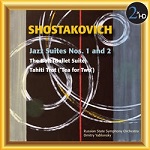 I
listened for comparison to the Concertgebouw/Chailly recording of the
two Jazz Suites and Tahiti Trot, coupled with Piano Concerto
No.1, on Decca Originals 4759983*, and that remains my prime
recommendation especially now that it’s at mid price, but the Yablonsky
performance makes an excellent alternative, particularly if you want
the excellent 24-bit sound, albeit at $16.74 much more expensive than
the Naxos CD. Stay with the Naxos if you don’t need 24-bit.
I
listened for comparison to the Concertgebouw/Chailly recording of the
two Jazz Suites and Tahiti Trot, coupled with Piano Concerto
No.1, on Decca Originals 4759983*, and that remains my prime
recommendation especially now that it’s at mid price, but the Yablonsky
performance makes an excellent alternative, particularly if you want
the excellent 24-bit sound, albeit at $16.74 much more expensive than
the Naxos CD. Stay with the Naxos if you don’t need 24-bit.
If you are happy with mp3, 7digital.com have the 3-CD Brilliant Classics set of the Jazz,
ballet and film music, with the Ukraine SO/Kuchar ‘anything but bargain
basement [performances]’ as Jonathan Woolf put it – review – for £5.49.
Don’t forget the superb budget-price recording of the two piano concertos
plus the enthralling mini-concerto, The Assault on Beautiful Gorky,
from The Unforgettable Year 1919, Jazz Suite No.1 and Tahiti
Trot: Dmitri Alexeev and Jerzy Maksymiuk, still available on Classics
for Pleasure 3822342 – download for £3.99 from sainsburysentertainment.co.uk .
* Stream from Qobuz but I can’t find a download less expensive than the CD, discounted to
£5.95 by one supplier as I write.
Ástor Pantoleón PIAZZOLLA (1921-1992)
Concerto for Bandoneón, Strings and Percussion [21:25]
Tres Movimientos Tanguísticos Porteños [19:10]
Decarisimo [2:43]
Inverno Porteño [6:52]
Adiós Nonino [8:14]
Milonga del Ángel [6:04]
(La) Muerte del Ángel [2:51]
Pablo Mainetti (bandoneón)
Orquestra de Cambra Teatre Lliure/Josep Pons
HARMONIA MUNDI GOLD HMG501595 [67:19] – from eclassical.com (mp3 and lossless)
Tangazo : Variations on Buenos Aires [14:23]
Tres Movimientos Tanguísticos Porteños [20:08]
Milonga del Angel [6:39]
Sinfonietta for Chamber Orchestra [15:42]
Württembergische Philharmonie Reutlingen/Gabriel Castagna
rec. February 2000. DDD.
pdf booklet available
CHANDOS CHAN10049 [56:29] – from theclassicalshop.net (mp3 and lossless) (also available on SACD, CHSA5006).
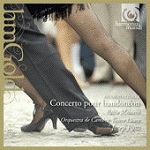
 Two
excellent recording of Piazzolla’s lively music – it’s just unfortunate
that there is such a degree of overlap. If packed off to my Desert
Island I suppose that I would opt for the Harmonia Mundi if only for
its inclusion of the Bandoneón Concerto, since the solo instrument,
a special kind of concertina, is so evocative of Argentina and of the
music of Piazzolla, who played the instrument in a band. It also comes
with a price advantage on CD as it has recently been transferred to
the mid-price Harmonia Mundi Gold series; though eclassical.com’s per-second
charging policy negates some of that advantage, at $12.12 their price
for mp3 and lossless is still competitive with the CD – target price
around £9.00 – and with theclassicalshop.net’s £9.99 for lossless Chandos
and even (just) with £7.99 for the mp3. Having opted for the Harmonia
Mundi, however, I’d miss the Sinfonietta on Chandos, so you may
wish to sample both albums by streaming from Naxos Music Library – Pons or Castagna – or Qobuz – Pons or Castagna.
Two
excellent recording of Piazzolla’s lively music – it’s just unfortunate
that there is such a degree of overlap. If packed off to my Desert
Island I suppose that I would opt for the Harmonia Mundi if only for
its inclusion of the Bandoneón Concerto, since the solo instrument,
a special kind of concertina, is so evocative of Argentina and of the
music of Piazzolla, who played the instrument in a band. It also comes
with a price advantage on CD as it has recently been transferred to
the mid-price Harmonia Mundi Gold series; though eclassical.com’s per-second
charging policy negates some of that advantage, at $12.12 their price
for mp3 and lossless is still competitive with the CD – target price
around £9.00 – and with theclassicalshop.net’s £9.99 for lossless Chandos
and even (just) with £7.99 for the mp3. Having opted for the Harmonia
Mundi, however, I’d miss the Sinfonietta on Chandos, so you may
wish to sample both albums by streaming from Naxos Music Library – Pons or Castagna – or Qobuz – Pons or Castagna.
If you’re happy with top-bit-rate mp3, the classicsonline.com price of £4.99 for the Harmonia Mundi is the least expensive.
 Reissue of the Month
Reissue of the Month
Arvo PÄRT (b.1935)
Berliner Messe [25:07]
The Beatitudes [7:01]
Annum per Annum [11:56]
Magnificat [7:04]
Seven Advent Magnificat Antiphons [14:58]
De profundis [7:19]
Rachel Elliott (soprano); Andrew Lucas (organ)
Polyphony/Stephen Layton
rec. Romsey Abbey, Hampshire, UK, 10-11 January, 1997 and St Paul’s
Cathedral, London, 6 January 1998 (Annum per annum). DDD
pdf booklet with texts and translations included
HYPERION HELIOS CDH55408 [73:25] – from hyperion-records.co.uk (mp3 and lossless) (Originally issued on CDA66960)
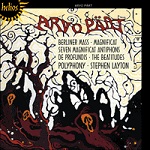 How
to describe Arvo Pärt’s music to those who have never heard it? Epithets
such as ‘ethereal’ and ‘uplifting’ but also ‘challenging’ would be a
start but I needn’t try too hard – even if you have never heard any
of his music before, which is unlikely as his Cantus in memoriam
Benjamin Britten, in various formats, is ubiquitous, you can try
the free track, De profundis, either from the Hyperion web page
or by downloading the free sampler for August 2014 while it remains
available. The sampler is particularly generous this time at 94:45,
containing not just the new releases but excerpts from the special offer
albums in the Composers of World War I series: HYP201408.
How
to describe Arvo Pärt’s music to those who have never heard it? Epithets
such as ‘ethereal’ and ‘uplifting’ but also ‘challenging’ would be a
start but I needn’t try too hard – even if you have never heard any
of his music before, which is unlikely as his Cantus in memoriam
Benjamin Britten, in various formats, is ubiquitous, you can try
the free track, De profundis, either from the Hyperion web page
or by downloading the free sampler for August 2014 while it remains
available. The sampler is particularly generous this time at 94:45,
containing not just the new releases but excerpts from the special offer
albums in the Composers of World War I series: HYP201408.
Better known as accomplished exponents of music from earlier times,
Polyphony are ideal interpreters of Pärt’s style which owes so much
to the past yet is of its own time and timeless. Andrew Lucas, a fine
if generally unobtrusive accompanist throughout, is soloist in Annum
per annum, appropriately recorded at Epiphany in St Paul’s. This
was already a fine introduction to the composer at full price; at its
new price (£4.99 for mp3 or lossless, £5.50 on CD) it’s a steal.
Canticles from St Paul’s
Malcolm ARCHER (b1952)
Benedicite, omnia opera (O all ye works of the Lord, bless ye
the Lord) [6:05]
Thomas Attwood WALMISLEY (1814-1856)
Magnificat and Nunc dimittis in d minor [7:24]
Sir Michael TIPPETT (1905-1998) Magnificat and Nunc
dimittis ‘Collegium Sancti Johannis Cantabrigiense’ [7:17]
Alan GRAY (1855-1935) Magnificat and Nunc dimittis in f minor [8:25]
Sir William WALTON (1902-1983) Coronation Te Deum (We
praise thee, O God) [10:56]
Sir Charles Villiers STANFORD (1852-1924)
Morning, Communion and Evening Service in B flat, Op.10:
Evening Canticle 1: Magnificat [3:59]
Evening Canticle 2: Nunc dimittis [4:10]
Alec ROTH (b1948) Jubilate [6:05]
Charles WOOD (1866-1926) Magnificat and Nunc dimittis in F ‘Collegium Regale’ [8:21]
Richard Fuest (treble), Harry Jackson (treble), Theo Nisbett (treble),
Matthew Venner (countertenor), Andrew Yeats (tenor), Timothy Jones (bass),
Edward Grint (bass)
Simon Johnson (organ)
St Paul’s Cathedral Choir/Andrew Carwood
rec. May 2013. DDD.
pdf booklet with texts included
HYPERION CDA68058 [62:42] – from hyperion-records.co.uk (mp3, 16- and 24-bit lossless)
 A
selection of canticles for the Book of Common Prayer composed by 19th and 20th century composer, with two forays into the 21 st century from living composers and performed by one of the best Anglican
Cathedral choirs under the direction of Andrew Carwood, who has also
directed the renaissance consort the Cardinall’s Musick in several first-rate
albums for Hyperion. With recording to match – intimate rather than
trying to capture the vast acoustic of St Paul’s – and lucid notes by
Andrew Carwood in a booklet well up to Hyperion’s usual high standard,
it’s hard to find any reservations. Audiophiles may turn up their noses
at the fact that the 24-bit download is only in 24/44.1 format but I
have no complaints on that score.
A
selection of canticles for the Book of Common Prayer composed by 19th and 20th century composer, with two forays into the 21 st century from living composers and performed by one of the best Anglican
Cathedral choirs under the direction of Andrew Carwood, who has also
directed the renaissance consort the Cardinall’s Musick in several first-rate
albums for Hyperion. With recording to match – intimate rather than
trying to capture the vast acoustic of St Paul’s – and lucid notes by
Andrew Carwood in a booklet well up to Hyperion’s usual high standard,
it’s hard to find any reservations. Audiophiles may turn up their noses
at the fact that the 24-bit download is only in 24/44.1 format but I
have no complaints on that score.
Apart from the opening Benedicite, Omnia Opera, an addition to
the Greek text of the Book of Daniel, prescribed as an alternative to Te Deum at Mattins in Lent and the Jubilate, another alternative
for Mattins, all the music comes from Evensong, but that merely reflects
the practical demise of choral Mattins except in cathedrals.
Guild Golden Age of Light Music
 Guild
seem to have discovered an unending stream of vintage recordings of
light music, from the 1930s to the 1960s. Some of them inevitably sound
their age but all have come up remarkably well in these transfers.
I’ve listed a few that have caught my attention, all available inexpensively
at £4.99 and all come complete with pdf booklet:
Guild
seem to have discovered an unending stream of vintage recordings of
light music, from the 1930s to the 1960s. Some of them inevitably sound
their age but all have come up remarkably well in these transfers.
I’ve listed a few that have caught my attention, all available inexpensively
at £4.99 and all come complete with pdf booklet:
• GLCD5148 The Great Light Orchestras salute Gershwin
and Kern – from classicsonline.com (mp3). Review and details.
• GLCD5159 More Strings in Stereo – from classicsonline.com (mp3). Review and details.
• GLCD5163 The Thirties Revisited – from classicsonline.com (mp3). Review and details.
• GLCD5184 The Lost Transcriptions 3 – from classicsonline.com (mp3) or stream fromNaxos
Music Library. Review and details.
• GLCD5200 A Glorious Century of Light Music (1929-1961)
– from classicsonline.com (mp3). Review and details.
• GLCD5211 Music While You Work 5 – from classicsonline.com (mp3). Review and details.
• GLCD5216 Springtime – from theclassicalshop.net (mp3 and lossless). Review and details DL
News 2014/8
There are many more where these came from, though I’m surprised to see
that only one, GLCD5184, is available for streaming from the Naxos Music
Library. Theclassicalshop.net also offer the series in lossless sound
for £7.99.
Where to begin, if you haven’t already done so? GLCD5148, the
music of George Gershwin and Jerome Kern from the likes of André Kostelanetz,
Robert Farnon, Stanley Black and George Melachrino, mostly recorded
in the late 1940s and the 1950s would be my Desert Island choice.
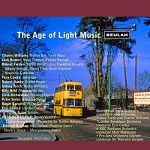 Continuing
the vintage light music theme, Beulah have recently released The Age of Light Music, recordings dating from 1942 to
1961 and including Charles Williams Trolley Bus and Yacht
Race, Jack Beaver News Theatre and Picture Parade,Robert
Farnon Willie the Whistler, Canadian Caravan, Ottawa Heights,
String Time, Alcan Highway and Mountain Grandeur,Eric
Coates London Calling and Salute the Soldier, Richard
Addinsell Desert Victory and Edward German Nell
Gwynn Dances. Performers are the Queen’s Hall Light Orchestra/Charles
Williams, Sidney Torch and Robert Farnon, the London Symphony Orchestra/Eric
Coates, BBC Northern Orchestra/Muir Mathieson and the Pro Arte Orchestra/Sir
Malcolm Sargent.
Continuing
the vintage light music theme, Beulah have recently released The Age of Light Music, recordings dating from 1942 to
1961 and including Charles Williams Trolley Bus and Yacht
Race, Jack Beaver News Theatre and Picture Parade,Robert
Farnon Willie the Whistler, Canadian Caravan, Ottawa Heights,
String Time, Alcan Highway and Mountain Grandeur,Eric
Coates London Calling and Salute the Soldier, Richard
Addinsell Desert Victory and Edward German Nell
Gwynn Dances. Performers are the Queen’s Hall Light Orchestra/Charles
Williams, Sidney Torch and Robert Farnon, the London Symphony Orchestra/Eric
Coates, BBC Northern Orchestra/Muir Mathieson and the Pro Arte Orchestra/Sir
Malcolm Sargent.
Transfers of this delightful music are well up to Beulah’s usual high
standards and the cover features one of their trade mark bus photographs
– in this case a trolley bus, neatly illustrating the first piece of
music. The Beulah webpage will direct you to iTunes but the album is
available in full 320kb/s mp3 and m4a for slightly less from 7digital.com.
I’d like this on my Desert Island, too, along with Guild GLCD5148.
I’m still catching up with some earlier Beulah releases, of which the
most interesting is Conrad Hansen at the fortepiano in Mozart’s Keyboard
Sonatas No.7, K309 (1-3BX333), No.11. K311 (4-6BX333),
No.15, K533 (7-9BX333) and No.16, K545 (10-12BX33) – from eavb.co.uk. Fortepiano
recordings were rare beasts in 1956/7 when these recordings were made
by DG; this is a somewhat clangy but not unpleasant example – oddly
described then as a ‘Mozart piano’ – but Hansen’s playing is stylish
even by modern standards, if a little unadventurous. No excuses need
be made for the quality of the recording in these Beulah transfers.
Also available from Beulah Korea as a single album, 1BX33K –
from kr.eavb.co.uk.
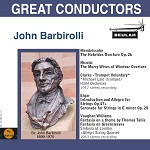 On
Beulah’s Korean releases Sir John Barbirolli is due to be added
to the tally of Great Conductors in classic performances of Elgar, the Introduction and Allegro and Serenade for Strings. These
are my ideal performances of these works and the transfers are little,
if at all, inferior to those achieved by EMI in 2000, as heard on the
latest reissue in lossless sound from Qobuz.
As on the EMI release, the Vaughan Williams Tallis Fantasia andGreensleeves
Fantasia are
On
Beulah’s Korean releases Sir John Barbirolli is due to be added
to the tally of Great Conductors in classic performances of Elgar, the Introduction and Allegro and Serenade for Strings. These
are my ideal performances of these works and the transfers are little,
if at all, inferior to those achieved by EMI in 2000, as heard on the
latest reissue in lossless sound from Qobuz.
As on the EMI release, the Vaughan Williams Tallis Fantasia andGreensleeves
Fantasia are  included
but Elegy, Sospiri and Delius Brigg Fair (EMI)
are replaced by Mendelssohn Hebrides Overture, Nicolai Merry Wives of Windsor Overture and Clarke’s Trumpet Voluntary. 10BX8K – from kr.eavb.co.uk.
included
but Elegy, Sospiri and Delius Brigg Fair (EMI)
are replaced by Mendelssohn Hebrides Overture, Nicolai Merry Wives of Windsor Overture and Clarke’s Trumpet Voluntary. 10BX8K – from kr.eavb.co.uk.
Baroque Concertos (1BX71K) includes Handel Organ Concerto
Op.7/1 (Eric Chadwick) and Oboe Concerto No.1 (Evelyn Rothwell) both
with Hallé/Barbirolli (1958) and reviewed as Beulah Extras in 2014/9, Bach Keyboard Concerto No.4 (Thurston Dart with the Philomusica
of London, 1959), Leo Cello Concerto in D (Enzo Altobelli) and Vivaldi Bassoon Concerto (Marco Constantini) both with I Music
(1960 – see June
2011/1), all stereo recordings. Of these the Dart remains the most
stylish even by modern standards – December
2010 Roundup – in many respects he was the grand-daddy of period
practice. The other recordings are all somewhat dated but ideal if
you think modern baroque performances too fast and slick.



 All Nimbus reviews
All Nimbus reviews








